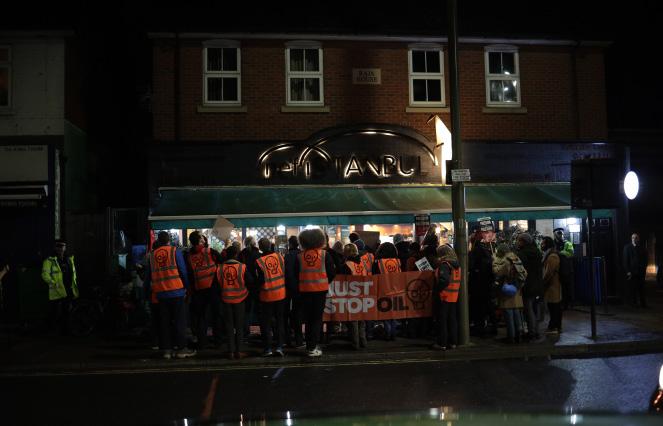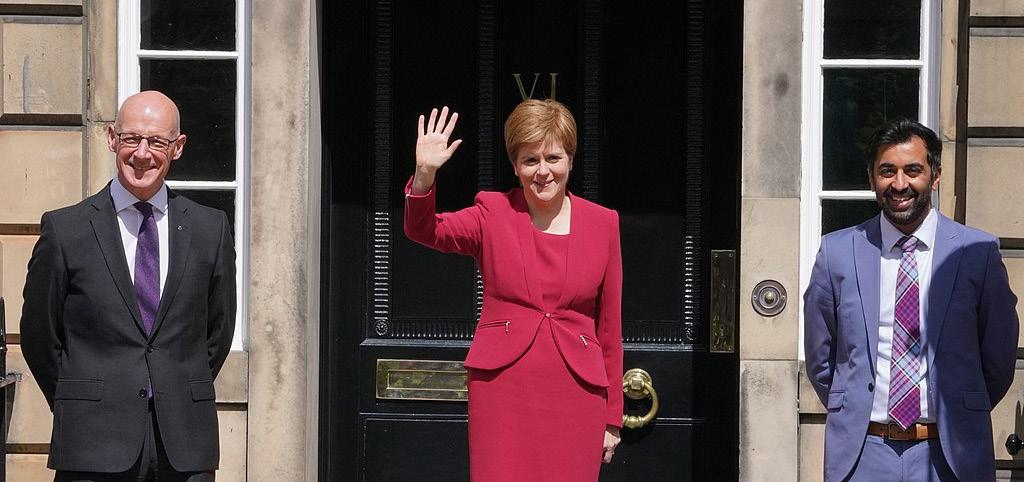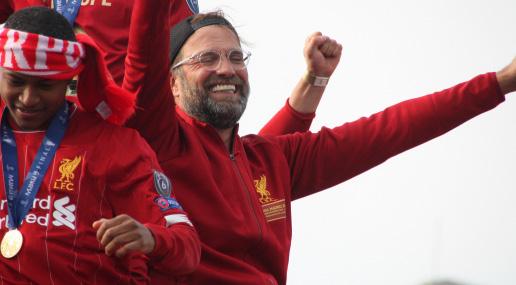Reflecting on LGBT+ History Month and the legacy of Section 28


Reflecting on LGBT+ History Month and the legacy of Section 28



The Hilary Term, Week 7 | Friday 1 March 2024

Isaac Chase Rahman, the Chair of Student Council, resigned at the start of Student Council’s week 7 meeting in an unprecedented move. The Returning Officer, Joe
Bell, also resigned separately. In the remainder of the meeting, heated questions were asked of the SU sabbatical officers and Trustee Board, with two votes on holding no con-
 Rose Henderson and Milo Dennison
Rose Henderson and Milo Dennison
fidence motions against Danial Hussain and the rest of the sabbatical officers now being held online. Chase Rahman’s resignation was in part due to Trustee Board block-
ing two motions for votes of no confidence in Hussain, the current SU President, and in Alfie Davis, VP Welfare-elect.
In his resignation statement, Chase Rahman cited a “disregard for democratic principles”, saying that the “events preceding the meeting have been wholly undemocratic.”
The Oxford Student understands that the two motions of no confidence were blocked by the SU Trustee Board due to institutional concerns.
A member of SU staff said in an email to the Steering Committee: “Unfortunately both VONC motions will have to be struck from the agenda for next week’s meeting. Trustee Board has informed us that both include content which is subject to ongoing investigations which will need to be resolved before the motions can be heard and we have highlighted some significant organisational risks with the Board.”
Read more on page 3
Chase Rahman said that the SU had “shut down student voices” with the explanations they provided for blocking the motions of no confidence described as “in-
Cameron Samuel Keys and
Gaspard RouffinOn the 23rd of February, a fundraising event by Labour MP Anneliese Dodds taking place in Cowley was met with protests from various activist groups, including Just Stop Oil (JSO) and other organisations in support of Palestine.
Anneliese Dodds is a Labour MP for Oxford East since 2017, and is also Chair of the Labour Party and Shadow Secretary
for Women and Equalities.
The protest started around 6.15, with various demonstrators holding pro-Palestine signs and wearing JSO highvis jackets. Protesters were blocking the pavement, and around 10 police officers were initially present on scene.
Chants included “Labour Party you can’t hide you’re supporting genocide”, repeated with “Keir Starmer” and “Anneliese Dodds”, “Brick by brick, wall
Read more on page 5
sufficient and unacceptable.”
He said that “the SU cannot function with such disregard for democracy” and that “no chair can continue like this” meaning he had to “make the decision to resign.”
He concluded his statement by hoping that “the organisation will reflect on its current flaws.”
The Returning Officer would normally act as Chair if the Chair was not present. As the Returning Officer had also resigned, the role went to one of the sabbatical officers. VP Liberation and Equality Kennedy Aliu, as the only sabbatical officer present in the room, became Chair.
Hussain and Rosalie Chapman, VP Welfare, were present via the online Teams call, but Mia Clement (VP Activities and Community) and Jenni Lynam (VP Undergraduate Education and Access) were notably absent. Nick Harris (VP Postgraduate Education and Access) was on bereavement leave.
Aliu opened with “how we all doing today?” which was greeted with raucous laughter by the room. Aliu
Read more on page 4
“The University should not still be investing in fossil fuels [and] banking on the… existential threat of our generation
- Elliot (Riz) Possnett at the Climate Justice protest outside the RadCam

EDITORS IN CHIEF
Tara Earley and Daisy Outram
ASSOCIATE EDITORS
Sami Jalil and Haochen Wang
STRATEGY
Rose Henderson and Milo
Dennison (Directors), Charlie Bowden, Martin Alfonsin
Larsen, Emily Hudson
CREATIVE
Elliot Francolla (Director), Blane Aitchison, Seraph Lee, Cameron Samuel Keys
NEWS
Gaspard Rouffin, Audrey Davidson-Houston, Ruby Hurst, Tasneem Jodiyawalla, Gabriella Kchozyan, Valida
Pau, Rebecca Whalley
COMMENT
Jack Arrowsmith, Thomas Cowan, Leah Gelber, Amelia Gibbins, Johannes Riese
PROFILE
Haochen Wang, Cora Alina Blau, Audrey DavidsonHouston, Tallulah Hawley
IDENTITY
Sami Jalil, Georgia Ferris, Nina Naidu
PINK
Etienne Baker, Elsie Haldane, Jacob Newby
COLUMNISTS
Blane Aitchison, Sharon Chau, Amanda Li, Nina Naidu, Jonah
Poulard, Matthew Taylor
FEATURES
Martin Alfonsin Larsen, Nayana Juliette Syed, Purav Menon
CULTURE
Keng Yu Lai, Amelia Gibbins, Tallulah Hawley, Isra Khan
GREEN
Bridget Harrington, Ava Chan, Sabine Zednik-Hammonds
SCITECH
Samkeet Shah, Ava Chan, Gabriella Kchozyan
OXYOU
Olly DeHerrera, Zaid Magdub, Florence Purcell
FOOD & DRINK
Johannah Mathew, Rebecca Whalley
SPORT
Thomas Thornton, Purav Menon, Johannes Riese
PODCAST
Haochen Wang, Treya Agarwal, Matthew Holland, Kitty Vesey, Cindy Yu

issuu.com/theoxfordstudent

It doesn’t really feel like the end of term, or the end of my time as Editor-in-Chief.
I knew when gearing up for this term that Hilary would be difficult to manage - and perhaps my tutors would say my suspicions have been confirmed - but OxStu has shown me that when you have the right people around you, working for a cause you all believe in, virtually anything can happen. We’ve seen some fantastic pieces in the paper this term, and I’m so proud of everyone who has shared their own words and views, especially any first-time contributors. It’s an incred-

One of my favourite parts of working for the OxStu is being able to reflect on all our hard work at the end of each term. It's been a pleasure to help publish such fantastic stories, and I'm so grateful to have been able to work with such a warm, friendly and enthusiastic team. Balancing my degree with my extracurriculars has been notoriously difficult, but having something to show for it at the end of the day makes it all worth it.
I must give a massive thanks to Daisy and Tara for leading the paper this term so fabulously. Here's to Trinity 2024 filled with even more to be proud of!

@theofficialoxstu
ible feeling to look back on all the creative, meaningful, and unique content we’ve been able to bring to the student body.
To Daisy: you have been the best partner-in-crime I could have asked for. It has been an honour to work with someone so thoughtful, wise, humorous, and kind, and I’m very lucky to have found a friend for life. We’ll be back next term on the strategy team, hopefully after sweeping ‘Best Dynamic Duo’ at the OxStu awards next week!
One final thank you goes to everyone else who has made this term at OxStu the best one yet: Rose, Milo, Haochen, Sami, Jack, Charlie, Martin, Ayomi, Gaspard, Olly, Valida, Blane, and the rest of the team. It’s been a pleasure.

The speed at which the last print edition rolls around always astounds me each term, but even more so now it marks the end of my time as editor-in-chief. It’s been a pleasure to lead such a wonderful team of student journalists, especially alongside the forever talented and thoughtful Tara. Our friendship has been such a joy this term, and I will always be grateful for her support. Looking back at my journey, I never would have expected to feel so settled at and then lead this paper. My first ever go at student journalism back home consisted of me being belittled

It is baffling to me how quickly this term has passed us by. While being an Associate Editor has perhaps seen this term be the most hectic and sometimes challenging term of my time at the OxStu, it has also been, with little question, one of the most enjoyable. Working on the podcast and Profile has been immensely rewarding, and I hope you might have enjoyed it as much as I did. Of course, all this, and the success of the paper, would have been impossible without the dedication of Daisy, Tara, Sami, Charlie, Milo, Rose, Gaspard, Martin and many more, so to them, and to you, thank you.

and dismissed from an event’s press team for being the only girl there who was assumed to have only joined for “fun”. At Oxford I feared the same would happen, but my time at OxStu has shown me the diverse and inclusive atmosphere journalism should always strive for. I would encourage everyone to get involved in student press for the confidence, belonging, and capabilities it gives you. Endless thanks to those that make OxStu this place for comradery and growth. Thank you to Tara, Haochen, Sami, Rose, Milo, Charlie, Ayomi, Blane, Martin, Gaspard, Jack, Etienne, Olly, and every team member along the way. Best of luck to our next editors-in-chief Gaspard and Martin, I can’t wait to see the heights to which our brilliant paper can go!








To get our newsletter, scan the QR code
Sign up to The Oxford Student newsletter to receive:
• Our news roundup for the week's top stories
• Weekly editors' picks for articles available at oxfordstudent.com
• A guide to events coming up in the week
• Our recommendations: books, films, and beyond!


To listen to the podcast, scan the QR code

This week's episode features:
• ARTICLE SPOTLIGHT: discussion of Jack Arrowsmith's article on honest journalism and Cora Alina Blau's profile piece "Dropping out of Oxford: Revisited"
• EiCs' corner: Daisy and Tara provide a behindthe-scenes view of the paper's work this week, alongside explaining what's going on in Oxford and selecting the top Oxfesses of the week



 Editor
Editor
Two Oxford academics have won their claim for employee status following an employment tribunal held in January at Reading Tribunal Hearing Centre. Rebecca Abrams and Alice Jolly, both award-winning novelists, had taught for 15 years on Oxford’s MSt Creative Writing course, a coveted program which attracts an average of 345 applicants annually.
According to Leigh Day, the legal firm representing Jolly and Abrams, the two had been employed on “fixed-term personal services contracts” with the University of Oxford. The two academics contested the fairness of these contracts, with Leigh Day stating that “Alice and Rebecca argued their case is about the employment status of lecturers who have been hired on personal service contracts. They maintained that their status at the University of Oxford was clearly that of employees and not as personal service providers or workers.”
Leigh Day explained that de-
spite Oxford writing a letter to the Society of Authors (SoA) in 2022 stating they would offer “more appropriate” contracts to staff, neither Jolly nor Abraham’s contracts were renewed for the following year.
Jolly, author of Dead Babies and Seaside Towns and Mary Ann Sate, Imbecile said on X that she was “overjoyed” with the ruling and called it an “important win” for higher education. Jolly thanked Oxford UCU (University College Union) and Oxford UCU Anti-casualisation Network for their “tireless work” supporting her. Jolly expressed in an earlier statement that “with nearly 70% of its teaching staff on precarious contracts, Oxford is one of the worst offenders, but this is an issue that extends across UK higher education. Casualisation is a race to the bottom – bad for teachers, bad for students, and bad for universities.”
Abrams, author of Touching Distance, Pied Piper of Covid, and The Jewish Journey: 4000 Years in 22 Objects, expressed similar sentiment via X, thanking the Oxford branch of UCU for their support.
The University College Union, which represents over 120,000 staff across the UK working in Higher Education, has campaigned continuously in recent years against what it calls a “casualisation” of staff contracts. In a 2023 ‘emergency report’ Oxford UCU reported that “hundreds of Universities and College staff members are effectively locked into a cycle of short- or very short-term contracts, sometimes lasting decades”. The Oxford UCU Anti-casualisation Network, a group organized by Oxford UCU members, claims that 77.2% of university staff are on what they consider “casualised and precarious” contracts.
Reacting to the ruling, Oxford UCU stated via X that “the gig economy has no place in higher education”. The Anti-casualisation Network continued by addressing the university directly, saying “@oxforduni, we’re watching: these practices won’t go ignored”.
A spokesperson for the University said: “We have been notified of the tribunal’s ruling on this preliminary hearing and are currently reviewing it.”
Cont. from page 1
described the events as “unfortunate” and “interesting”.
As none of the other sabbatical officers were there in person and there were issues with the Teams call, Aliu proposed not doing the standard procedure of the sabbatical officers reporting on their activities, instead telling attendees to read sabbatical officers’ uploaded reports on the SU website. Hussain was the only sabbatical officer who had not uploaded a report.
A number of questions were put to Hussain by Luca di Bona. They asked about the absence of Hussain’s report to Student Council, and about decisions taken by the Trustee Board of the SU – in particular, their decision to block two submitted motions that would have brought votes of no confidence in Hussain and Alfie Davis, the VP Welfareelect.
The Trustee Board is made up of all of the sabbatical officers, as well as student and
external trustees. It is legally responsible for the SU, and as such has final say on what motions can be heard at Student Council.
Di Bona then brought a procedural motion to hold two emergency meetings in 8th week Hilary term in order to bring a vote of no-confidence in the SU President. They said they brought the motion in response to the concerns raised by the Chair at the start of the meeting, and due to Hussain failing to submit a report to Student Council, as well as the insufficient answers he gave to questions about this that evening.
A no confidence motion has to be brought to two consecutive meetings and passed before a referendum can be held.
The meeting then devolved into a shouting match after Shermar Pryce, previous SU Presidential candidate, challenged the grounds on which the motion had been brought. He said that Hussain had nothing to do with the blocked motions, and so it wasn’t fair to bring a motion for a vote of no confidence against him on those
grounds.
After a member of SU staff restored order, multiple questions were asked to the members of the Trustee Board as to why they blocked the original motions for votes of no confidence.
Attendees of Student Council were told it was due to confidential matters relating to internal investigations that the motions had been blocked, with Chapman adding that there were also welfare concerns. Pryce dismissed these reasons as “buzz words.”
Attendees were repeatedly left waiting in silence for answers from any of the sabbatical officers, or from Nikki Smith, CEO of the SU, who was also on the Teams call.
Smith told attendees multiple times that if they wanted to ask questions they had to address them in writing to her via email, even after Pryce said that this was an “unacceptable” response. Smith said that a timeline regarding a response from the SU about why their motions had been blocked had already been given to those that had proposed the original no confidence motions.
Pryce said he was raising questions at Student Council because he wasn’t satisfied with the explanations he had received via email.
Univ JCR passed a motion of no confidence in Davis earlier this week. It has said it will disaffiliate from the SU unless a motion of no confidence in Davis is allowed at Student Council. Pryce is the ex-JCR President at Univ.
In response to a question about what investigation had specifically blocked the motion against Danial Hussain as the investigation for which he was suspended since October has now concluded, Smith stated that the SU does not comment on internal HR matters. This was met with laughter from attendees.
After discussions relating to the fact that all of Trustee Board were responsible for the original motions being blocked rather than just Hussain, Pryce brought a procedural motion to hold two emergency meetings in 8th week, running “directly after” the meetings relating to Hussain, in order to bring a motion for a vote of no confidence in the entire sabbatical
officer team. Although both the procedural motions to bring votes of no confidence passed when voted on at Council, Eleanor Miller, VP Undergraduate Access and Education-elect, brought another procedural motion to vote again on the no confidence motions but online instead of in person due to concerns regarding the pressurised environment in the room making it difficult for delegates to vote openly.
This motion passed with a clear majority, meaning the Student Council delegates, including those who weren’t at the meeting, will have the chance to vote on the vote of no confidence procedural motions for a period of time yet to be set. Usually motions have a 48 hour voting window that opens later in the evening after Student Council.
If the motions pass, emergency meetings will be held in 8th week to vote on passing a motion to hold a vote of no confidence in Danial Hussain and a vote of no confidence in the entirety of the sabbatical officer team.
Sixty UK Universities, including Oxford and Cambridge, have put forward a “request for proposals” (RfP) aimed at finding more environmentally sustainable investment opportunities. The proposal is seeking companies with the capacity to “create a market for cash products that do not contribute to the financing of fossil fuel expansion.”
The RfP states that the cosigned Higher Education institutions, including 8 individual Oxford Colleges, “may each allocate up to several hundred million GBP or more across several products proposed by the respondents to this Request for Proposals.”
Such investments will come in the form of deposits and money market funds, which are a type of mutual fund highly desired for their low risk and high liquidity.
The stated primary goal of the RfP is to “avoid financing companies that are constructing new coal- and gas-
fired power plants in OECD countries.” The stipulations for investments include meeting the International Energy Agency’s (IEA) Net Zero Emissions by 2050 Scenario, among other criteria such as “financing of renewables in lower income countries.”
Cambridge’s Chief Financial Officer, Antony Odgers, explained that the RfP is aimed mostly at companies which “may have products, strategies, and/or commitments that have not yet launched”.
This RfP comes at a time where University’s across the UK are under major pressure to divest from fossil fuel markets. Last week, The Oxford Student reported that Oxford had increased its investments in fossil fuels to 31.2 million in 2022, despite a 2020 pledge to ban direct investments in fossil fuels.
The 2020 pledge followed mounting student pressure to divest from fossil fuel companies, including demonstrations at the 2018 boat
race in which a banner was dropped reading Oxbridge Divest accompanied by orange smoke flares. When announcing the pledge in 2020, Oxford described itself as a “world leader in the battle against climate change.”
However, environmental group Students Organising for Sustainability has criticised the ambiguous use of language in “direct investments”, as well as highlighting that this divestment pledge doesn’t apply to External Asset managers, who make investments to gener-
ate profit on the university’s behalf. Despite the 2020 pledge, climate protests have continued across Oxford, including the Radcliffe Camera being painted orange by Just Stop Oil protesters in October 2023.
The University declined to further comment on the matter.


The Covered Market, one of the longest-running markets in the UK, is celebrating its 250th anniversary all throughout 2024.
Located in the heart of Oxford’s city centre, the market has been in operation since 1774. From its modest origins with timber stalls, it has since blossomed into a buzzing, expansive marketplace that brings in visitors from all over the world.
ern logo itself uses a serif font to reflect the historic qualities of the market. Together, the special edition branding demonstrates continuity and transformation over the last 250 years.
cil approved a £6.87m investment to refurbish, upgrade, and improve the market while remaining sensitive to its unique heritage and history.
by wall, Israeli apartheid has to fall”, “Resistance is justified when people are occupied”, and “Israel, UK, USA: how many kids did you kill today?”.
Dodds was heckled when she arrived around half an hour later, with protesters chanting “shame on you” and being instructed by police officers to stop banging the barriers outside the restaurant. The number of protesters grew to over 40, with a little under 15 police officers on site.
Just Stop Oil protester chants “Stop Tory Oil” were quickly drowned out by proPalestine chants, with passerby disapproving JSO and telling them to “grow up.”
An Oxford student from JSO then made a speech, saying he was here in “solidarity” with the other campaigns.
He stated that the Labour party were “cowards” for “watching a genocide unfold in Gaza”, and that “everybody in the Labour leadership is cowardly spineless or pure evil.” He demanded that Dodds calls for immediate ceasefire, that Labour calls for an arms embargo on Is-
rael, that Labour commit to restoring the £28bn green pledge it had cut two weeks ago, and that Labour commit to revoking oil and gas licences.
Around 8pm, two student protesters inside the restaurant stoop up on tables, holding a Just Stop Oil banner and a Palestinian flag respectively. The demonstrators then spoke to Dodds and the police, and left the restaurant a few minutes later, joining the protest outside.
The protesters reportedly handed a letter with claims from JSO to Dodds, and one of them said “ We know that all genocide is interlinked. We know that all this human suffering is interlinked and we have to stand up against it.”
Dodds then attempted to calm the protesters down, saying ‘‘we say we don’t want any new licences” and that she was ‘‘really happy to have a chat’’ with them.
Dodds accepted the letter from the protesters which was handed to her by a police officer saying “Just give me the letter”, to which a demonstrator replied “Can we have a conversation about this at some point? That would be really helpful. Thank you.”

The Covered Market is hosting a wide variety of 250ththemed celebration events meant to highlight its development and growth over the years. The market has continuously supported local businesses and traders, and helps foster a sense of community in the city. Visitors can find specialist artisan produce, cafés, restaurants, shops, and more.
These celebrations offer an opportunity to strengthen Oxford’s business scene and solidify growth in the post-pandemic period. Some of these celebratory events include an anniversary edition of the annual Easter Egg Hunt, May Morning festivities in partnership with The Market Tap by Tap Social, and a birthday party with a ceremonial cake cutting.
Other plans are currently in the works, such as a potential collaboration with the Museum of Oxford and a merging of the market’s Christmas celebrations with wider anniversary festivities.
In a statement, The Covered Market said the events will “solidify the market as a vibrant place for people to come together.”
Apart from special events and activities, The Covered Market is now also decorated in new biodegradable bunting and entrance banners with anniversary edition branding. According to the team, the new branding is meant to reflect the evolution of the market.
“We’ve created this special edition branding to replace all our usual branding and used a gold colour to add extra brightness and a sense of a particularly special celebration,” the team said.
Since the market was founded before the invention of photography, the new design features a hand-drawn ribbon that reflects the illustrative style of the 1700s. The ribbon design has been mixed in with the modern logo. The mod-
The Oxford City Council collaborated with local designer Big Top Design to create the new branding, which can also be seen on collectable anniversary tote bags. Big Top Design are also designing three other anniversary posters set to be put out later this year. Carbon Colour, another local independent business, has helped with printing throughout the branding process.
The Council has continuously supported the evolution of the market, ensuring standards remain high and visitors have a positive experience. In 2021, a Leasing Strategy was adopted to support highquality independent retailers while sustaining a balanced variety between businesses and spaces available.
The investment includes efforts to make Market St. more pedestrian-friendly and create a more spacious commercial centre.
Simultaneously, a yearlong trial of extended opening hours launched in May 2023. The market extended the evening hours for Thursday through Saturday until 11pm, but working hours for different businesses vary. The longer hours have contributed to the increase in visitors and will continue throughout the year to support anniversary celebrations. Since April 2023, The Covered Market has sustained a visitor rate above pre-pandemic levels.
The Covered Market remains a historical gem of Oxford. What was intended to just be a meat market became a place of eateries and various traders by the end of the 19th century.

In 2022, a City Centre Action Plan was put into effect to promote the growth and resilience of Oxford’s city centre in the post-pandemic period. The plan fosters stakeholder cooperation and is in place until 2030. The effects of this plan are evident in the market’s impressive increase in visitors over the years.
Footfall data helps illustrate the positive effects of recent Council efforts to transform the market. In 2019, The Covered Market had 297,302 visitors in the summer months. In 2022, there were 238,243, marking a sharp decline as a result of the pandemic. Council initiatives have helped recoup and surpass pre-pandemic levels. In 2023, there were 310,283 visitors in the summer period.
2023 marked a pivotal year in redevelopment for the market, overlapping with the increase in footfall. The Coun-
It has since survived proposals to demolish and move it, before ultimately being listed as a grade II establishment in March 2000.
The market has undergone tremendous transformations since its inception. It maintains its pertinence and prosperity largely thanks to Council efforts.
The Covered Market team commented: “The Covered Market has been at the heart of Oxford’s community for 250 years, it has played a part in so many lives and the Council wants to ensure it stays that way. They have planned many activities throughout 2024 that will be available for anyone to join, in a way that works for them.”
With 250th anniversary celebrations underway, celebratory decorations and activities have been carefully planned to showcase the market’s continued
The Oxford Climate Justice Campaign (OCJC) protested the University of Oxford’s fossil fuel investments outside the Radcliffe Camera on 23rd February.
The Oxford Student reported last week that the University had increased its indirect fossil fuel investments through its endowment fund OUem by around £31.2 million in 2022, an increase of over £12m in one year.
The protest took place in Radcliffe Square at 2pm on Friday, with around 15-20 demonstrators present. Protesters handed out leaflets to passersby, and posed with signs and a banner calling for divestment.
The signs and banners read “OUem is burning our future”, “Oxford University greenwashing”, and “Oily Oxford.”
The leaflet stated that “more than 1 in every £200
the University invests is still going to the likes of Shell, ExxonMobil and BP,” which “amounts to over £30 million.” It also read that “Oxford’s ethical investment activity (ESG engagements) has sharply declined,” and called for students to “take action now” by emailing University leadership “urging them to stop rolling back ethical investment commitments.”
The organisers of the protest from OCJC commented that “the fact that fossil fuel investments have gone up is pretty shocking,” and that it was “important to make people aware” and to “keep the tension on this important issue.”
The Oxford Climate Justice Campaign also urged ViceChancellor Irene Tracey to “take meaningful action on this.”
Elliot (Riz) Possnett, SU presidential candidate, was present at the protest and commented that “the University should not still be
investing in fossil fuels”, and that it was “banking on the… existential threat of our generation.” Possnett added that there is “so much more they [the University] need to do – this is the least they can”, and that “we [students] are paying for the worst things you can imagine by going here [Oxford University].”
Mia Clement, VP Activities and Community of the Oxford SU, was also at the demonstration. She had previously commented on the issue, stating: “Students will
be disappointed to see this decrease in ethical engagement, the absence of a clear strategy for escalating such engagements, and significantly increased active investment in fossil fuels.”
The University has been under mounting criticism for failing to sever ties with the fossil fuels industry, notably with Just Stop Oil painting the Radcliffe Camera orange in October, and a report showing Oxford accepted £1.2m in funding from fossil fuel companies in 2022.

Oxfordshire County Council has been accused of hypocrisy over its plans to expand Oxford’s Zero Emission Zone (ZEZ) after the cost of these plans was revealed.
The proposed project involves charging non-electric vehicles for driving through the ZEZ with an aim to improve the city’s air quality. However, the ethics of the project have been questioned by several Oxford City Council members when it was revealed that expanding the ZEZ would cost £5.8 million.
Sajjad Malik, an Independ-
ent city councillor for Temple Cowley ward, said that the ZEZ was a “congestion charge” rather than an attempt to reduce emissions in the city centre. He further commented that “you can have a big van that smokes like hell and still pay the council to drive it… people have already been turned away from Oxford and now there will be more empty shops in the city centre.”
Malik described the ethos of the county council’s scheme as being “as long as you can pay us you can drive any vehicle”. He also claimed that the city not having bus services that are fully compliant until 2030, when the council plans for all its buses to be electric,
is hypocritical. “You can only preach what you practice”, he said of the claimed hypocrisy.
In response to Malik’s claims, County Council cabinet member for development strategy Judy Roberts said that the proposals are only drafts and “will be informed by our conversations with business and residents”, adding that the ZEZ “is all about making our city cleaner and healthier”.
“Following a public consultation, the county council’s cabinet will make a public decision on whether to expand the ZEZ”, she concluded.
Emily Kerr, a Green Party city councillor for St Mary’s ward, stated that “the existing pilot


Prince Edward, Duke of Edinburgh and youngest sibling of King Charles, visited Oxford on the 20th February 2024.
Prince Edward was set to visit The Old Fire Station and Damascus Rose Kitchen, a social enterprise comprising a theatre, gallery, Crisis centre, and Middle Eastern restaurant supporting refugee women; The Story Museum; and Flo’s The Place in the Park, a shared community space.
ZEZ has already been shown to improve emissions in the city centre, contributing to the overall 8.3% improvement in Oxford’s notoriously bad air quality last year.”
Kerr also pointed out that the ZEZ was first proposed in 2015, giving businesses “plenty of time to switch away from the most dirty vehicles”, and the costs for driving through the ZEZ were as low as £2 per day.
The pilot of the ZEZ was introduced in nine streets in the city centre, including Cornmarket and St Michael’s, in February 2022. In the first six months of its imposition Oxfordshire County Council accumulated almost £120,000 in fines. By law, any income from the ZEZ can only be spent on local transport improvements.
Data from the City Council also suggests, in contradiction to Malik’s claims that the ZEZ is detrimental to local businesses, that footfall in the city centre is at a healthy level.
Last month a new fleet of 159 electric buses was launched in the city, costing £82.5 million. In October last year the County Council decided to continue the Low Traffic Neighbourhoods scheme in east Oxford.
He arrived at the Story Museum on Pembroke street a little before 12pm. After being taken through the immersive exhibitions, he listened to traditional storytelling and met with the young 12-16 year-old story curators of the museum.
Prince Edward then visited the Old Fire station on George Street, before going to Flo’s the Place in the Park in Cowley. The royal visit ended around 5.30pm.
Police was mobilised around Oxford to ensure Prince Edward’s security, including four officers on motorcycles. The Thames Valley Police commented to The Oxford Student that TVP “supported the visit of Prince Edward to Oxford this afternoon and it passed without incident.”
The Story Museum commented that they “were really proud to welcome His Royal Highness,” and that he “seemed to be highly engaged and excited by The Story Museum and he was lovely company.”
They added that “The Story Curators were […] really enjoyed showing their costumes” and that they “are already showing a sense of ownership within The Story Museum, and really feel part of the team, which is exactly what we’re aiming for.”
The University of Oxford has released its 20222023 report on Student Welfare and Support Services. The number of students that registered with the service was 3,228, down from 3,595 last year. The added pressure on the service from both the pandemic and its aftermath appears to be gradually dissolving.
Many of the statistics and sentiments of the report echoed previous years. Anxiety remained the biggest issue for students, with 31.1% of students accessing the service because of it. The demand for the Disability Advisory Service (DAS) continued to rise, with 27.7% of the student population now ‘known to the service’. Female and White students remained slightly overrepresented in the statistics.
Increased wait times were noted in both the Counselling Service and the Sexual Harassment and Violence Support Service reports, with overall wait times increasing from 9.4 to 10 days. Despite this, the re-
port stressed that 83% of students found their wait times ‘easy to manage’ or ‘manageable’.
Students had an average of 3.35 sessions, with a large proportion having in-person sessions at Worcester Street. Around 25% of students had just one session.
Of students reporting incidents to the Sexual Harassment and Violence Support Service, 76% had a single session. However, the report highlighted that this included ‘detailed and tailored follow-up information’. 24% of students accessing the Welfare Service reported the number of sessions as too low.
Nevertheless, the report celebrated positive Clinical Outcomes. Whilst 48% of students rated their level of emotional difficulty as very severe or severe before utilising the service, only 7% still did after receiving support. 88% of students rated their counsellor as good or very good.
Jane Harris and Katherine Noren, the Co-Directors of Student Welfare and Support Services, stated that “It has also been particularly encouraging to see students increasingly
engaging with the online consent training”.
Compared to the 949 students who completed this training between 2021-2022, 1778 students completed it between 2022-2023. However, this was still almost half the number of students that completed it when the training was first launched in 2020-2021.
Whilst the number ‘seeking support’ from Sexual Harassment and Violence Support Service was in line with last year, there was a wider range of requests. More students received support for coercive control and childhood sexual abuse. 49% of these requests were related to a ‘non-University context’.
There was a reduction in the number of reported incidents that involved staff members. The report pondered over whether this was related to the introduction of the studentstaff relationship policy that was introduced in Hilary 2023.
In their statement, Harris and Noren stated that they are “pleased to see the various support services are being so well utilised”. This is evident from the 827 students that attended groups or workshops
hosted by the Welfare Services on topics including Perfectionism and Finding Your Voice. In collaboration with the University’s Gardens, Libraries and Museums (GLAM), these were held all over Oxford from the Ashmolean to the Botanical Gardens.
Looking to 2023-2024, the Disability Advisory Service Report highlighted the implementation of a new tailored Student Support Plan, which will enable students ‘with specific learning difficulties
(SpLDs) to access a range of standard adjustment recommendations in a more timely, efficient way’.
The Sexual Harassment and Violence Support Service has secured funding to ‘employ another full-time Specialist Caseworker’ which will help relieve staff pressure and increase the capacity of casework teams to work more efficiently.
Finally, the Counselling Service has identified accessibility as ‘a priority area for review’ in 2023/24.

On February 22nd, the Oxford Union debated the motion, “This House believes Ukraine should negotiate with Russia to end the war now.”
The debate came when the next weekend would mark the second anniversary of Russia’s full-scale invasion of Ukraine. On February 17th, Russia took the town of Avdiivka in eastern Ukraine, marking its biggest gain since capturing Bakhmut in May. Though support for Ukraine among Europeans remains broad, only 1 in 10 think Ukraine can win, according to a survey by the European Council on Foreign Relations (ECFR), with most seeing a “compromise settlement” as necessary to end the conflict.
Opening the debate for the proposition, Finley Armstrong, current Treasurer of the Oxford Union, asserted that Ukrainian survival is entirely dependent on foreign aid and the support of the international community. Armstrong touched on the stalemate Ukraine faced on
the frontline after 150 billion worth of aid while Russia, without support from other countries, is still able to fight this war.
Armstrong stated that “aid is not an exhaustible resource” citing domestic priorities and economic constraints of donor countries. He concluded that negotiations with Russia were the “new path of peace” and that we should be champions of the “preservation of life and peace” instead of voting for “continued violence and bloodshed”
Speaking first for the opposition, Rachel Haddad, on the Secretary’s Committee, began her case with a personal touch, telling the audience that she has lost communication with her grandmother and uncles since Russia’s invasion. Haddad believes peace talks with Russia are “useless, baseless, and absurd” because Russia “neither respects nor acknowledges the sovereignty of Ukraine.”
She listed Russia’s history as an “unreliable negotiating partner” that long violates non-aggression treaties with Ukraine. In particular, she spoke about the 1994 Buda-
pest Memorandum, in which Ukraine exchanged its nuclear arsenal for security guarantees. According to Haddad, negotiating with Russia is like negotiating with Adolf Hitler. Haddad concluded her speech with a message of hope, citing Ukrainian poet Tara Shevchenko, “Keep fighting — you are sure to win!”
James Lawson, Membership Officer at the Oxford Union, advocated strongly for Western interests. He said avoiding negotiations with Russia would hinder the “a 21th-century Marshall Plan” of post-war recovery effort that is necessary for both Ukrainian and Western long-term stability. On top of economic costs, he touched on the threatening political disunity, stating “that cooperation is crumbling… and newspapers are growing tired of the war.” Lastly, Lawson stressed the long-time horizon of a conservation of Western military capacity, so there would be no chance of aggressions in the Middle East or a Chinese invasion of Taiwan in the future.
Ross Skowronski spoke next for the opposition.
Skowronski is the founder of Mission Kharkiv, which has facilitated the transportation of over 70 tons of lifesaving pharmaceuticals to his native Kharkiv since the war began. Skowronski argued that negotiations are set to fail since negotiations present a trade, but Russia is only motivated by “the land and the people” of Ukraine. He stated further that future negotiations were unlikely to be respected if Russian elites’ sources of income remain intact.
Closing the case for the proposition, Aniket Chakravorty began his argument by stating that self-determination and a free life without fear are the most important objectives for Ukranians. Chakravorty argued that Ukraine lacks continuous training for Ukrainian troops and the ample armaments, yet given the opposition of Republicans to Ukrainian aid in the United States, he said that the “window of winning is diminishing.”
However, he was optimistic if Ukraine committed to negotiations, given that the “Western support is like -
ly to increase to Ukraine when there is a clear endgame in mind.” According to Chakravorty, the prospect of Ukraine joining the NATO and EU as “a thriving state on Russian doorstep” would be the strongest refute to Putin.
Lord Houghton of Richmond, former Chief of the Defence Staff of the British Armed Forces, closed the debate for the opposition.
Lord Houghton argued that, although there is enduring peace in Europe, a negotiation for a premature peace would not be in the longterm interests of Ukraine and the West. To him, Russia has failed in its war effort, and thus he believes “we should be ever more confident in supplying Ukraine with the military resources it needs.”
At the end of his speech,
Lord Houghton addressed the floor: “The way you vote tonight sends a message. It sends a message to Putin, and it sends a message to the people of Ukraine. Please do not send the wrong one.” The motion did not pass, with 71 members voting in favour and 171 members voting against.

certain statistics within them.
Another fifth week has been and gone, and one can’t help but reflect on morale around Oxford as the end of term draws closer. Hilary is always a difficult one - there’s a distinct lack of the sunshine, Pimms, and punting that characterises Trinity, or the festive Oxmas cheer to get you through a gloomier Michaelmas. But let’s be honest with ourselves:
The dreaded “fifth week blues” seem to permeate much more of life than we might hope. Rarely does a conversation go by without a joke - or a threat - of rustication in our banter.
The question is far from a new one, but I’ll ask it again: Why do Oxford students seem to have such a rough go of it? Are we alone in our woes? And what can be done to promote positive welfare practices?
During the UCAS application process, I was surfing The Student Room for information on colleges, when I came across a post advising readers not to attend Oxford if they had a history of mental health issues. Odd, I thought. Yes, Oxford is Oxford, with all the scary prestige that might be attached to that word, but surely it couldn’t be that gruelling as to come with a full trigger warning? Was it truly so fundamentally different from other universities?
Something that has piqued my interest in comparative discussions has to do not with university league tables, but
The National Student Survey (NSS) gives a useful indication of student satisfaction rates with their courses and providers. Until recently, I don’t believe Oxford has participated in the survey, due to an SU boycott regarding concerns over the “marketisation” of students. But I feel this has come at a detriment - it’s a valuable opportunity for us to give feedback on a meaningful level, and see where we rank next to other providers. And the figures are not as glowing as we might think.
“...surely it couldn’t be that gruelling as to come with a full trigger warning?”
This same survey is what has ranked St Andrews, my home town, in the top spot of league tables for the last two years, achieving the highest score for student experience. Oxford’s late re-entry to the NSS means that student satisfaction scores are not incorporated into our overall league table standing. If they were included, would we still rank so highly? Perhaps there was an ulterior motive in opting out.
Looking at specific NSS questions, we get a sense of where Oxford is falling short. The lowest score for providers across the board ironically came from
the question: “How clear is it that students’ feedback on the course is acted on?” The score for the UK as a whole was a 60.9% positivity measure - when looking at Oxford in isolation, this fell to 41.4%.
On the question, “To what extent does your course have the right balance of directed and independent study?”, Oxford scored a 68.8% satisfaction score in comparison to the UK’s 76.2%. Similarly, the positivity measure for Oxford sat at 65.1% when asked, “How well organised is your course?”, in comparison to the UK’s overall at 72.6%. On these measures, at least, Oxford seems to be lacking.
Clearly, the truth is that Oxford is different in some way. It should be clear by now that I don’t say this to suggest that Oxford students, or our academic system, are superior by any means. Rather, I feel there is a deep flaw somewhere within the University itself, and the enormous pressure it puts on students.
The workload is an easy place to start - it’s no secret Oxford puts its students through the wringer. My worst essay crisis came in Hilary of first year, when I somehow found myself with four essays due in one week. At what other higher education institution in the country, bar our chum (on these matters, anyway) Cambridge, would this be acceptable? Thankfully my tutors were quick to give me a reprieve, although the situa-
tion could have been avoided entirely if the joint honours schools had been able to communicate whatsoever - alas, this is a topic for another day. This flexibility with tutorials does beg the question of why we spend so much energy producing rapid-fire essays when they don’t count for much. They are a useful tool for learning and exam preparation, to be sure, but the onslaught of deadlines creates a rushed atmosphere where knowledge is inhaled and dumped onto a page at the fastest speed possible, rather than consumed in the considered and thoughtful environment of review that one might expect. The archaic tradition of degree classification being entirely dependent on finals is also puzzling, only inevitably creating more anxiety later down the line.
“...measures that would be taken for granted at other universities and institutions must be fought for tooth and nail here.”
Perhaps most simply put, measures that would be taken for granted at other universities and institutions must be fought for tooth and nail here. The Educational Recordings Policy, introduced in Michaelmas 2022, was certainly a step in the right direction, but
it’s still up to the discretion of each department whether or not they want to disseminate those recordings among students. The DPIR Director of Undergraduate Studies issued an email in recent months stating that Politics lecture recordings were not available to students without a Student Support Plan, arguing that they would “miss out on the drama and sense of event of the lecture”.
That is, if you have lectures at all. In one meeting, a tutor stated to our cohort that this was a university for “self-starters”, and that if we were unhappy we were free to leave and seek teaching elsewhere - this being in response to a friend asking innocently enough why they only had one contact hour a week that term. In Michaelmas last year I was told the lecture series for my first Oxford paper would not in fact be running until Hilary, and I now know this is an overwhelmingly common experience. I understand niche modules might operate out of sync with the curriculum at large, but for core and introductory papers this seems a glaring issue that we’re told to overlook. The sad reality for many humanities students is that large parts of your degree may be entirely self-taught. Term structure presents another confusion. After ramming as much study as possible into the eight-week framework, vacation is not a time for rest, but rather a looming sense of collection paranoia. Friends from other universities were
shocked when I told them we have exams - again, not that they count for anything important - straight after Christmas. Of course exam stress and ehaustion at the end of the term are natural, but these feelings are only exacerbated by Oxford’s system, culminating in a pointless exercise (collections) that is still guaranteed to induce guilt and stress in students. And this is without consideration of internships, jobs, and any preparation for the term ahead.
A variety of other factors compound to make university life, regardless of provider, a more overwhelming experience than it is necessarily stereotyped to be. Extracurriculars should, in theory, provide a welcome break from the chaos of degree work, but often being on committees or in leadership positions can take up an unexpectedly large amount of time and energy, bringing nothing but extra responsibilities and stresses to the table. After all of one’s efforts, they might then log on to Facebook and find a series of anonymous Oxfesses spewing negative feedback about whatever event or activity they had poured themselves into. Once again, I don’t suggest that these occurrences are unavoidable, but rather just that there is a lot going on behind the scenes with each and every student that we can’t possibly be aware of.
“In any case, the burden of care placed upon students is heavier than it ought to be.”
What, then, does welfare really look like at Oxford? It’s tempting to argue in its favour. After all, we have a strong culture of “welfare” within our societies, with most having a welfare representative and plenty of events and support for students who might be struggling. We also have welfare reps (not to mention peer supporters) throughout the collegiate system, who put their heart and soul into running a great welfare week for the rest of the cohort. And for this, they deserve all the appreciation they receive and more. But it seems wrong that these already overworked students are burdened with even more on their shoulders, at a time when we’re express -
ly told we should be feeling “blue”. Is it fair that the welfare of the rest of the student body comes at the expense of our welfare reps? And how much benefit do we truly derive from these welfare activities? In any case, the burden of care placed upon students is heavier than it ought to be.
“...there is a way for feedbackstudent to be at the forefront of withoutwelfarestudents themselves being required to solely carry the load.”
The seemingly obvious solution is for our staff, and our institutions, to do a better job of engaging with student welfare and offering genuine support. It’s clear from speaking to a majority of tutors (at least in my experience) that they do not have the time or capacity to hear about undergraduates or their lives outside of whatever’s been jotted down in this week’s essay. Many seem fundamentally unable to identify behaviours that may be indicative of serious mental health struggles or other welfare concerns behind the scenes. The recent High Court ruling on the University of Bristol v Abrahart case has serious repercussions for higher education institutions. It’ll be interesting to see the changes that Oxford makes in response to this ruling.
As we approach mental health week in May, we should turn our attention to what might be done to better support student welfare.
Last year we herded in some alpacas, which were nice for the ten or so minutes we were allowed to get close to them but unlikely to improve welfare in the long-term. Instead, perhaps we should prioritise healing the student-staff relationship at Oxford. There is a way for serious discussions about mental health to take place, and for tutors to be appropriately looped in. There is a way for the university to make profit that doesn’t require students being booted out of the city every eight weeks. And there is a way for student feedback to be at the forefront of welfare without students themselves being required to solely carry the load. We just haven’t quite worked out what it is yet.

It’s been a year since Nicola Sturgeon resigned as Scotland’s First Minister, after almost a decade on the frontline of politics. At the time, I questioned what Sturgeon would be remembered for, but few of us could have predicted that within months of her departure images of a blue forensic tent outside her and former SNP chief executive Peter Murrell’s house would dominate the front pages. Whilst the Scottish leader had long been the stoic counterpart to chaos in Westminster, 2023 saw the SNP embroiled in investigations over financial irregularities and lies to journalists about the party’s membership figures.
“...there has hardly been a week since last February when Sturgeon hasn’t appeared in public.”
South of the border, Boris Johnson’s premiership was becoming ever more fragile, leading eventually to the ‘3 PMs and 2 monarchs in one year’ situation, and a soggy lettuce coming to represent Liz Truss’s catastrophic 50 days in power.
Humza Yousaf, Kate Forbes and Ash Reagan all raised concerns
that the contest to replace Sturgeon would be biassed or undemocratic, but with Yousaf eventually coming out on top, what is the state of Scottish politics now?
Despite her resignation and clear desire to protect her personal life from the papers, there has hardly been a week since last February when Sturgeon hasn’t appeared in public. Perhaps most concerning are the emerging revelations which point to a culture of secrecy and dishonesty amongst Sturgeon’s closest allies during the pandemic, which came to light in her recent admissions to the Covid inquiry. Amidst more than five hours of questions, Sturgeon acknowledged that not only had she deleted thousands of WhatsApp messages containing important decisions about the nation’s lockdowns, but that she clearly has not listened to her advisors.
A recent podcast from Tortoise described how, many years earlier, Sturgeon had failed to heed warnings about a potential conflict of interest within the party, as her husband took a leading role in the SNP. This decision has had serious repercussions - in December 2022 it emerged that Murrell had loaned over £100k to his party, whilst Sturgeon stated that constant rumours about her marriage and sexuality played a role in her return to the backbenches. As I write, reports are suggesting that Sturgeon may face police ac-
tion over her misleading of the covid review.
Consequently, it is not surprising that Sturgeon broke down in tears this month as she sat in front of the panel, admitting that she wished she had not been First Minister during the pandemic. Whilst some decried her ‘crocodile tears’, and pointed to her inability to stay in step with Westminster’s Covid rules as part of the problem, Sturgeon has evidently been wounded by attacks on her character and the repercussions of the party’s opacity. But her own burnout paled in comparison to recent claims that Sturgeon “absolutely failed” young people in Scotland, despite the SNP’s efforts to reduce child poverty and promote equality through universal baby boxes and free school meals. It is amidst these swirling rumours and vicious debates that Humza Yousaf has stepped up.
“Humza... has been unable to escape the trail of problems left behind by his predecessor.”
Appearing on a recent episode of ‘Pod Save the UK’, Yousaf’s jokey banter and shared cultural references with hosts Ash Sakar and Nish Kumar gave the impression that everything in
his party was under control. The First Minister’s goal of achieving a “Tory-free Scotland” was a far cry from the personal and professional priorities which dogged his first year in office. The SNP are slipping down the polls as the first UK-wide general election since 2019 looms, and Yousaf himself remains less popular and less well-known than Sturgeon.
“...there is no doubt that Yousaf’s Muslim Pakistani heritage has branded him as a target.”
Humza ‘Useless’, as he has been dubbed by The Spectator, has been unable to escape the trail of problems left behind by his predecessor, from an incessant focus on another Scottish Independence referendum (despite widespread concerns about the current cost of living crisis), to former health secretary Michael Matheson’s apparent misuse of parliamentary funds and subsequent resignation.
And Yousaf has faced personal heartache too. Despite being one of the most powerful people in Scotland, he could do nothing to ensure the safe passage of his wife’s parents, who were trapped in Gaza following Hamas’s 7th October attacks. He called for an independent Palestinian state, and for humanitarian aid to be allowed into Gaza, at a time when many Labour politicians were remaining on the fence about the conflict. Yousaf also wrote to all UK political leaders urging for an immediate ceasefire. Behind the scenes, he was facing racist abuse not only from constituents, but from X (formerly Twitter) owner Elon Musk too. He now carries a panic alarm, and there is
no doubt that Yousaf’s Muslim Pakistani heritage has branded him as a target.
But he has also been applauded for his progressive stances. Whilst fellow SNP politician Kate Forbes’ religious views may have put her on the back foot with voters, and Ash Reagan quit Holyrood over the gender recognition reform bill, Yousaf has been a strong advocate for LGBTQ+ rights. But in recent days Yousaf’s commitment to gender and sexual equality has been called into question as it emerged that the First Minister met with Sir Brian Souter - a conservative known to fund evangelical organisations accused of discrimination, widespread sexual harassment, and forced adoptions. Although it appears that Yousaf was naive to Souter’s influence and direct opposition to many SNP policies enacted under Nicola Sturgeon - such as abortion clinic buffer zones - the debacle will do no favours for the FM’s public image.
So, where does all this leave Scottish politics? It is hard to tell which way the vote will swing - particularly as Rishi Sunak is yet to set a date for the general election - but significant Labour gains are predicted across the UK. By the end of the year Yousaf may well be voted out, and a Labour majority in Scotland could be on the cards, especially after the party’s repeated by-election wins. At only 38 years old, Yousaf should have a long political career ahead, but his rift with political heavyweight Alex Salmond and previous mental health struggles may prove limiting factors. Halted building projects and staff strikes are also plaguing NHS Scotland and doubts have been raised about the SNP’s commitment to funding. Whatever happens, 2024 will be a decisive year for the SNP, as Scots turn to the polls to decide who they trust with the nation’s future.

‘We don’t have that facility I’m afraid’ - Mental illness and the Oxford experience

‘We don’t have that facility I’m afraid’. This was the single line response to my request to join an in person class via teams. I had just started a new antidepressant and was dealing with the side effects, unable to stand for more than a few minutes without feeling queasy. Despite my intense episodes of panic and chronic anxiety, until this point I had managed to attend every contact hour and meet every deadline of the term. But at what cost?
I think a general misconception about mental illness is it is solely that - mental. It is true that I live inside my head. That critical internal voice perpetually doubting myself and what others think of me. But it is also intensely physical. The nausea, dizziness, headaches, hot flushes, muscle cramps, tension, heart palpitations and the trembling. None of that is conscious or controllable. And many of its triggers are unavoidable in university life. Anxiety is deeply personal and contingent. About 90% of the time I am fine and can work no differently to my peers. Yet during a flare up, the worst trigger is being stuck somewhere like a class or a lecture where I cannot leave without everyone noticing. When I do attend, I can
never fully focus, counting down the minutes until I can leave. Tutorials can be a ticking time bomb. It’s exhausting and defeating. What is most frustrating is that I want to focus. I know I can participate. I know what everyone tells me is right, that ‘everything will be fine’. But no matter how many times I tell myself that, my brain and body won’t listen.
“My struggles are deeply personal but not unique.”
There is no let up in an Oxford term. It’s a whirlwind and a constant blur of new demands, the inability to take a meaningful break only worsening the guilt and constructing a cycle of unproductivity. It wasn’t always like this. In first year, when my symptoms responded well to medication and I could juggle work, socialising and exercise with ease and I thought I had it nailed. But anxiety is unpredictable, sneaking- up when you least expect it. The cruel irony of being knocked down from a period of confidence and control is a blow in itself. I am loud about how I feel. I take no shame in talking about my mental illness. Whilst I frequently worry I am a burden on those around me, I refuse
to suffer in silence. I have spoken to my college welfare officer, I have signed up for counselling, I do yoga, I go to the gym, I take medication, I have a work-life balance, I leave Oxford frequently to escape the bubble. I do everything right. But this isn’t a prescriptive ‘cure’. I am still mentally ill and probably will be for the rest of my life. My struggles are deeply personal but not unique. I love my degree and am deeply passionate about my subject. When I struggle to work it is not out of laziness or poor organisation. It is an invisible mental barrier that should be treated no differently to any physical condition. Rustication is not the answer for me. I know that with the right support I am entirely capable of completing my degree. Most of the time, tutors are understanding of my needs. But the denial of simple arrangements to make my degree more accessible can feel like a slap in the face. What my experiences have taught me is that much of the official university rhetoric on mental health is superficial. It’s okay not to be okay… until it’s not. My demands are not radical, but their reception reveals an underlying apathy to the practical arrangements of dealing with mental ill-health within Oxford’s rigid academic structures. The problem of accessibility lies not with individuals, but the system.












































The OxStu has had the fortune of covering some great news pieces and interviews in the past, and I have had the fortune of occasionally being involved in a few. Even now, the UCAS applicant in me still struggles to believe that I was able to speak with Dr Matthew Williams, his video tips and guides were instrumental to my – and I’m sure countless others’ – applications. Yet, the opportunity to speak with Jonathan Wilkinson, the Canadian Minister of Energy and Natural Resources, was perhaps the most surprising one of all.
It began with an email – not from the OxStu, but to us – asking if we would like to cover Wilkinson’s visit to Oxford following his trip to Paris for the International Energy Agency (IEA) Summit in Paris and before the second Canada-UK Critical Mineral Investment Forum. Of course, we immediately jumped on the opportunity.
The purpose of his visit was to speak on the potential of new technologies such as carbon capture and offer some reflections on his time at Oxford and how that has influenced his career. A Liberal, Jonathan Wilkinson has served as the Minister of Energy and Natural Resources in Canada since 2023, having previously worked as the Ministers of Environment and Climate Change and Fisheries, Oceans and the Canadian Coast Guard under Justin Trudeau. A PPE graduate of Exeter College, Oxford, Wilkinson, upon his arrival (by train and foot, of course), was quick to express his excitement to be back in Oxford.
“Oxford taught me how to think, how to work your way through problems and, to be honest, how to work.”
In describing his transition from an initial business career working at Bain & Co., to later
Deputy Editor: Haochen Wang Section Editors: Cora Alina Blau, Audrey Davidson-Houston, Tallulah Hawley profile@oxfordstudent.com
serving as a CEO in a company in the clean-technology industry, to finally joining the politics sphere, Wilkinson describes how all of his professional pursuits were driven by a longstanding passion and interest in giving back to the public sector. With many in the room being Rhodes Scholars like himself, Wilkinson shared his belief that “one of the reasons you get selected for a Rhodes Scholarship is because of your desire to give back in some way.”
Before a question about the bipartisanship of politics was raised, however, Wilkinson was quick to pre-empt it, noting that “climate change is an existential threat to the future of the universe. It is a science issue. It shouldn’t be a partisan issue.” He was emphatic in noting that despite the massive amounts of effort given to tackling the climate issue, a distinct characteristic of North American politics is its binarization, “in Europe, by and large, it’s less of a partisan issue. I understand there are differences, but it’s not nearly as stark as it is in North America, both in the United States and in Canada right now, where you have
political parties on the right that essentially either don’t believe in climate change or really don’t think progressing on it is particularly important.” To him, a significant goal for the Canadian ministry, and indeed other ministries, is “to try to find a way to narrow the gap such that you can have changes in government without huge swings in the commitment to progressing on climate change.”
Drawing on this and bearing in mind the somewhat recent controversial spraying of the Radcliffe Camera by student protestors of Just Stop Oil, I asked for his perspective on whether there exists a “best” or most “just and efficient” method to climate activism and protests.
He stood somewhat neutrally, “I mean there’s the activism side of it, but there’s also getting engaged in the actual policy development side and part of that can be that when you finish [university] you’re going and actually being part of an environmental organization or going and working with the government.” Indeed, part of his – and Canada’s – efforts
recently, and as presented in the IEA Summit, was the integration of population groups previously unengaged with the conservation of the planet: the youths and the indigenous populations. He mentioned the creation of a Youth Council of 12 across Canada which meets every couple of months and “actually talk about policy and they actually provide ideas.”
“...climate change is an existential threat to the future of the universe. It is a science issue. It shouldn’t be a partisan issue.”
Building on this, I asked Wilkinson what he thought the role of tertiary educational institutions like Oxford is in platforming issues such as environmental and transition to cleaner energy, to which he confidently replies that Oxford, and particularly its tutorial system, is an “enormously powerful way of training minds that are going to be curious about how to actually solve a lot of these problems.” Once again,
he drew on his own experiences in working for both the private and public sectors, encouraging those in the room to actually putting your hand up and indicating an interest, and it doesn’t mean by having you working in public policy that that’s necessarily where you end up. But it is something that I think you would find enormously interesting, and probably enormously rewarding, and it’s probably part of your DNA in terms of looking for places where you can actually give back.”
Of course, with a room full of Rhodes Scholars and other enthusiasts in climate politics, I had little time to ask questions, but was able to sneak in a few more. One of which was the impact that the Russo-Ukrainian War and the subsequent trade sanctions, blockades, and losses had on the global energy transition.
To this, Wilkinson, who chaired the task force on gas in Europe, was optimistic in mentioning that a 10-point plan on how to actually reduce the utilisation of gas was drafted and executed which, since then, has seen “enormous growth in renewables, and we’ve actually seen growth in energy efficiency. So that has reduced the use of gas by a significant amount in the aftermath of the war.”
Throughout all of this, Wilkinson repeatedly expressed his praise for the tutorial system at Oxford, stating (again) that “it taught [him] how to think…it actually allows you to take problems and disaggregate them in a way that, at times, I think it’s hard for Canadian institutions, where you have 500 young people in one class, to actually have the same kind of impact.”
Further, he was passionate in encouraging the Oxford student population to pay attention to the humanities and social sciences, mentioning that “we need engineers and all of that, but we also need people who understand politics. And ideally we need engineers who understand politics and understand public policy.”
The full interview available at oxfordstudent.com

Martin Alfonsin Larsen
To interview Molly Bloom is to interview someone who was once a near-Olympic skier, suffered a traumatic, career-ending injury, moved alone to LA to have a break before starting law school, became a poker game runner featuring some the world’s most sought-after male celebrities, had that game collapse, move to New York, start a new game, have it shut down by the FBI, and later be indicted in a money-laundering scheme. If it sounds like the plot beats of a breathless Hollywood movie - well, it was made into one by Aaron Sorkin, the West Wing creator.
The other side of that movie, though, finds Bloom, played by Jessica Chastain, navigating blistering silences and guilt. In our conversation, we discussed how #MeToo has changed Molly’s perspective on her time running games, how she found peace after having her life upturned, and her plans to move from making playgrounds for men to spaces of empowerment for women.
First of all - did you actually ever play poker?
[No], because most of the other game runners would play in their own games. When they had a bad night, they would manipu - late the rake or not pay players on time. It just seemed like a big liability, so I stayed away and I didn’t play.
But two years ago, my friend who has a hedge fund had a bunch of women come over to play, and they’d been taking poker lessons for three or four weeks. They wanted me to play and I said, “I’ll play, but you’re all going to have to sign an NDA because I’m terrible, and everyone will expect me to be great.” Well, turns out,
“... movements take time and they ebb and flow, and the women’s movement has really suffered some setbacks as of late”
”I’m actually not terrible. I watched so many hands of poker, you know, and they thought I was just hustling them to take all their money. I was getting hands like you can’t believe. But it’s funny, becuase I don’t think it normally works that way. If I would have watched a bunch of mogul skiing for years, it’s not like I could just put on skis and be a great mogul skiier. But I guess with games, and game strategy, it’s different. I still would get crushed by anybody who was good at poker.
Since the accident happened that ended your career in skiing, have you skied again?
Yeah, I love it - it’s just such a part of me. That’s where I can go and just disappear from the world. Like, put me in the middle of a snowstorm atop a mountain - nobody asking me for any favours. It’s just really a place where I find peace. Your book came out before the MeToo movement took off. The film was produced before, but it came out after. How has that tidal wave of a movement impacted your perception and how you feel about those experiences that you had organising poker games, and perhaps before that?
That’s a very interesting questi you feel about those experiences that you had organising poker games, and perhaps before that?
It’s interesting, because the film came out in that year that people were starting to have those conversations. I remember being in the room with a male studio head, and he said, “I can’t make a movie about a girl that runs an underground business, but doesn’t have a love interest - that’s an indie film. I can’t make that a big movie.” Things like that were not unfamiliar. When I first started running the games, the guys would
flirt with me and hit on me and offer to buy me things at Barney’s. I was like, “No, thanks”.
When I started running the game, particularly when I became the bank, they lose a big hand, stomp out and say, “Don’t bother calling me, I’m not going to pay.” And I’d be like, “So the trip to Barney’s is off?” I saw and listened to conversations at the table. I heard things that as a woman I found to be concerning, disrespectful, and just sad in the lack of respect that I could tell that these people had; not all of them. I had to make a choice. Am I going to let this stop me, or hold me back in any way? Or am I going to look at this as part of the litany of obstacles and problems that come from starting a business?
And I decided to do that. I decided to use strategy, and wits, and everything to work my way around it, while still believing and supporting the larger movement. But I think that movements take time and they ebb and flow, and the women’s movement has really suffered some setbacks as of late. And I think that it’s very important to support [it]. But to not wait for it.
So building on that, lots of celebrities, public figures, politicians, businesspeople played at your games, and the tabloid press inevitably has an obsession with those sorts of things. You use the word business to talk about what you do, and you talk about entrepreneurship. Do you think those discussions cheapened the consideration of the fact that these were like highly meticulous environments that you created?
I think all of the conversations before I wrote my book were the low hanging fruit, and reduced me to a sexy girl in a sexy outfit. And that pissed me off the most. Because whether you
like the business that I started or not, it was a real business. I became the bank. I did all of the marketing. I put up all the capital, I collected all of the debt with no official recourse. I figured out how to master the customer experience. I had 20 people working for me. I never stopped improving. I was paying my taxes. I had an S corp, and I was making $6 million a year. And I alone had to deal with every single issue; people trying to cheat in my game, people trying to steal my game, and people threatening me and, and I had to navigate it all by myself. So you can say whatever you want about me, but I was not standing in the corner in a sexy outfit. I think that I knew inherently that I had to get a different narrative out there if I ever wanted to have a career again. I basically needed my resume to be an Aaron Sorkin movie with that level of scale. Can you tell me a bit more about what exactly your plans are like for a women’s empowerment platforms, and what are the life lessons and goals young women should have focus on?
I’m a strategist, and I have some odd life experiences. I spent the last couple years thinking about how to combine all of these and create something that will really have impact. And I am very sure about a couple of things.
I’m very sure that self help doesn’t work. I’m very sure that making changes within a community, where that is the culture, is extremely effective, and much more powerful. I believe that mentorship can change your life, and mentoring can change your life. I also believe that it’s hard to get good high level information about solutions to problems we encounter as women. What it looks like right now is the
title, The Smart Girl’s Guide to Everything, starting with a podcast. Every week, we’ll have something that is in the effort for you to find your true power
I don’t care how you want to use it - I mean, as long as you’re not gonna use it for crime. If the girl or woman that just wants to find and marry a really rich guy and you stay at home - great, this will work for you. Your current strategy of sending naked selfies and not knowing who you are and not knowing anything about the world - that’s not going to work for you. This is for every woman. You want to marry a rich guy, or be the President of the United States - this is for you to find your power.
We listen to podcasts, we get galvanised, and then we’re on to the next thing - there’s no place where it exists to repeat in our life. So this podcast will have different episodes that are very specific about how to be successful in the world. So say you have a podcast about financial literacy. We talk about investing in public markets, which everyone should do, even if they have $200. We have the podcast, then on the app, you can choose to be part of the Action Programme. So on Wednesday, everybody opens a Charles Schwab account. On Thursday, you put $10 into this index, until there’s action items that create impact. Everything from financial literacy, to understanding power dynamics and relationships, to beauty, health, and wellness, but not the bullsh*t, actually peer reviewed science. From the podcast, and the things that people are interested in, you start to see the community develop, and the community supports each other. There’s community engagement throughout it.
The full interview available at oxfordstudent.com
Recently, I had the opportunity, or rather the privilege, of watching a production of Victor Hugo’s Les Misérables (more commonly known ‘Les Mis’) at the Sondheim Theatre in London with one of my friends from St John’s College, Oxford.
Les Misérables, set in 19thcentury France, follows the character of Jean Valjean, a French peasant who had to serve nineteen years in prison, five for stealing a loaf of bread to feed his sister’s starving child, and the remaining fourteen for his multiple attempts to escape. Valjean then tries to start over in life, complete with a name change and a new outlook on life. However, a police inspector named Javert relentlessly follows him through most of the play, refusing to let Valjean escape justice. Valjean and other characters are inevitably swept into France’s revolutionary era, where a group of idealists try to overthrow the government at a Parisian street barricade. It tells the story of
loss, power, poverty, and corruption, all of which remain relevant today.
It has always been and will continue to be one of my alltime favourite theatrical productions. As a musical theatre enthusiast, I was thoroughly impressed. From the performers themselves to the extraordinary orchestra, – the production was incredibly well done. Personally, the most powerful moment was in Act 1, with the song “Do You Hear the People Sing” by the revolutionary idealists. The song incites a sense of rebellion, morale, and determination, lifting the audience’s spirits after the numerous traumatic events beforehand (I will not give any spoilers, but there is a lot of death, melancholy, and shattering of hope in this play). As a French student, however, I was even more pleasantly surprised that despite the production’s deviations from the text (primarily due to its length), it is nonetheless entertaining. Hugo wrote Les Misérables as a portrayal of the French cultural identity during the 19th


century. He utilizes an array of comprehensive issues and themes, such as destitution, moral ambiguity, and strict law enforcement, to demonstrate the characteristics of French society during the Revolutionary period. By presenting France through the eyes of Jean Valjean, he illustrates French cultural identity. Even though the play does deviate from the text, it still manages to portray this sense of French cultural identity and deals with the same themes which Hugo dealt with.
Killian Donnelly, a tenor from Meath, Ireland, returned to the role of Jean Valjean in the West End, having also starred as Jean Valjean in the UK and Ireland tour. He is also known for playing the Phantom in the West End production of The
Nowadays, it is too common for someone to say they’re “having an ADHD moment”, to the point where ADHD and neurodiversity have become some kind of social media trend. We now have a really healthy and welcoming community online where people are able to self-diagnose things that had been dismissed their entire lives, but it’s being shut down by suspicions around where all these people with ADHD have
suddenly come from. In reality, it’s a pretty simple answer to what is in many ways a harmful and unproductive question: more people are getting diagnosed with ADHD because more people know about it.
Firstly, ADHD can present very differently, but the common stereotype known to most is of “the naughty, disruptive little boy”. As a result, many young children who don’t fit neatly into this box are overlooked, and these children eventually grow into the teens and adults who are now
Phantom of the Opera, and even had a Broadway debut in which he played Charlie Price, the protagonist in Kinky Boots. We were both very lucky, since he played Jean Valjean in the production that we watched, and to say that he was incredibly talented is quite an understatement. His vocals gave me chills, and I will wholeheartedly admit that I did shed some tears during his rendition of “Bring Him Home,” an emotional ballad sang in the style of a prayer about a character named Marius at the barricade. Theatre and dance editor of Time Out London Andrzej Lukowski states in his review that “‘Les Mis’ has a towering passion and operatic intensity – not to mention absolutely belting tunes, in gorgeous multilayered vocal arrangements
– that operate on a visceral, gut level. It whumps you in the solar plexus”*. I do agree with him, especially with regard to the ‘towering passion and operatic intensity.’ It is very emotionally intense, but it is well worth the tears. While it is a rather long show, time quickly passes thanks to how the story has been paced – and, yet again, it is credit to those involved in the production that ensure that the show is just as captivating at the end of the show as much as it is in the beginning.
Overall, the performance was extraordinary, and I highly recommend seeing it on West End if you are ever in London!
*Lukowski, Andrzej. “Les Misérables Review: Still Very Much ‘Les Misérables,’ in All Its OTT Glory.” Time Out London, Time Out, 7 Feb. 2022.
realising that the behaviours they were scolded for are really just traits of ADHD. Biological females in particular often present ADHD very differently and are thus diagnosed later in life; similarly, the “gifted” child with ADHD is often dismissed because from an academic point of view, there are no issues.
Secondly, ADHD is often masked by other conditions, including depression and anxiety (sometimes stemming from a lifetime of being told you’re “lazy” or “stupid”). ADHD also very commonly presents alongside autism (creating the intersectional AuDHD), so sometimes one is diagnosed and the other is missed.
And thirdly, access to support is gradually getting better, especially as people reach adulthood
and are able to make their own medical decisions. Many people may present clear traits of ADHD in childhood, but their parents and guardians may be the ones creating a block - often because of their own inability to “accept” or process their child having ADHD.
I got an educational diagnosis of ADHD last summer, and I’m still coming to terms with the fact that I deserve to be supported. It’s taking me a second to undo a lifetime of being told I was “stupid”, “lazy” or just not “trying hard enough”. But one thing I can say is that without the amazing community out there of people with ADHD sharing their life experiences, I would’ve never even considered whether I had it myself.
ADHD is not a trend. When you say you’re having an ADHD mo-
ment, do you really know what that means? Do you understand what it’s like to live every day with ADHD, or are you wearing a disability like a fun hat just because you feel like it? Exploring your identity and framing your experiences in new ways is very different to using ADHD as a catchphrase.
To those of you reading this who think you might have ADHD, I want you to know that you’re loved and accepted. There’s a whole community out there waiting to welcome you regardless of whether you have proof. If we stop invalidating what it means to live with ADHD, maybe more people facing barriers can connect with the neurodivergent communtiy and learn to love the person they find beneath their mask.
The month of February is celebrated across the UK as LGBT+ History Month and was founded in 2004 by Schools OUT UK co-chairs, Paul Patrick and Professor Emeritus Sue Sanders. It has its origins in the US celebration, which was founded to centre around National Coming Out Day. In the UK, the month coincides with the abolition of Section 28, a piece of legislation introduced by Margaret Thatcher’s Conservative government in 1988, which prohibited the ‘promotion of homosexuality’ by local authorities.
“...the legacy of Section 28 still looms large in the British political landscape.”
The law was only abolished in 2000 in Scotland, and in 2003 in England and Wales. From this perspective, celebrating the nineteenth annual LGBT+ History Month feels miles ahead in terms of progress. In Oxford, the majority of colleges flew progress pride flags, and a number of colleges and libraries ran specific seminars and events to commemorate the month.
Nationwide, Stonewall ran a campaign to ban conversion therapy, and worked to ‘protect LGBT+ inclusive education.’ Local areas ran a plethora of museum displays, seminars, film evenings and pop-up events. Only twenty years on from the appeal of Section 28, this type of commemoration is a welcome shift. However, in the midst of rising levels of transphobia and homophobia, and an increasingly volatile culture around LGBT+ rights, the legacy of Section 28 is still pertinent. This month has been marred with a number of events that
make it more difficult to look back on history and mark progress.
On the 7th February, Keir Starmer began a Prime Ministers Questions (PMQs) by commenting on the tragedy of Brianna Ghey’s death, and noting that her mother, Esther Ghey was in the gallery with them. In spite of this, later in the session, Rishi Sunak responded to a question by pointing out Starmer’s ‘broken promises’,w including a jibe about how Starmer had broken his promise of “defining a woman – although in fairness that was only 99% of a U-turn.” This follows Starmer’s earlier comments to The Sunday Times that 99.9% of women “of course don’t have a penis”, although Downing Street was ‘unable to say whether this is what Sunak was referring to.’ Sunak has also refuted several opportunities where he has been asked to apologise.
This incident displays the carelessness of transphobic rhetoric that is still ever-present in British institutions and from political actors. Stonewall also called for Sunak to apologise, saying that “for the Prime Minister to use trans people as a punchline, in front of the grieving mother of a murdered trans child, was cheap, callous and crass.” Additionally, resistance to the commemoration only exacerbates this feeling. The Pride Pillar, which is installed at London Bridge Station, and features a number of LGBT+ flags, was confirmed to be vandalised and the progressive flag torn down on the 19th February. In the context of remembering the struggles for LGBT+ rights, constant reminders of the severity of current erosion of LGBTQ+ protection leaves a bitter taste.
Equally, the legacy of Section 28 still looms large in the British political landscape. Despite later retracting his comments, David Cameron, now back in government as Foreign Secretary in Sunak’s Cabinet, made a number of public criticisms of repealing the legislation.

These included accusing thenPrime-Minister Tony Blair of being ‘anti-family’ for seeking to abolish the act.
The abolishing of the act was the product ten long years of campaigning in the face of continued opposition from the press. The volatile discourse sparked by this debate has not disappeared since its abolition, though. The government’s draft guidance for transgender students shows the continuing presence of government regulation into LGBTQ+ freedoms in school, as it presents transgender children as a ‘contested belief.’ Stonewall has said that if implemented, it could “have a chilling effect akin to Section 28.”
“The abolishing of the act was the product of ten long years of campaigning...”
A 2014 report found that three in ten secondary school teachers and two in five primary school teachers still didn’t know if they were allowed to teach lesbian, gay and bisexu-
al issues. The 2019 reform to Relationships and Sex Education (RSE) teaching in the UK, which introduced a number of LGBT+ inclusive reforms, including that schools must teach about multiple fam- ily types, was faced with resistance and protests at a number of schools. Prior to this, the last time the guidance had been updated was in 2000, before the repeal of Section 28 had even taken place. Research also shows that the majority of the British public support talking positively about family types, including LGBTQ+ families. However, the issue still attracts significant attention in the mainstream media.
These conversations around LGBTQ+ inclusive education have origin in the Section 28 discourse, and continue to cause a number of issues for LGBTQ+ children. According to Stonewall in a 2017 report, percent of transgender students face abuse for their identity, and half of LGBT students hear homophobic slurs ‘frequently’ or ‘often’. Dominic Arnall, the chief executive of charity Just Like Us, who aim to improve the lives of LGBTQ+ young people, said that “LGBT+ young people have been facing more tension
at home than their peers, they report feeling significantly less safe at school, and they’ve been cut off from their usual support networks in lockdowns.”
“...campaigners continue to try and secure LGBTQ+ safety from problems such as rising hate”
The enduring legacy of Section 28, even on the nineteenth anniversary of LGBT+ History Month is still felt acutely. Rising transphobia in Britain, including from politicians such as the Prime Minister themselves, and new guidance that could threaten the safety and inclusion of transgender students, leaves this month as more negative than it should be. Instead of looking back and learning about the progress made, the contemporary issues are ever-present, as campaigners continue to try and secure LGBTQ+ safety from problems such as rising hate, conversion therapy, and LGBTQ+ inclusive education.
Just last week, the Alabama Supreme Court ruled that frozen embryos produced by IVF should be considered ‘extrauterine children’, a decision which signalled the largest rollback on reproductive rights in America since the 2022 overturning of Roe v Wade. Ruling on two wrongful death cases brought by couples who had frozen embryos destroyed by accident at a fertility clinic, the Chief Justices overturned a lower court verdict that the embryos did not qualify as a person or child.
“This is part of a larger, more sinister, trend.”
Even though the State Attorney General’s office has outlined they have ‘no intention’ of pursuing criminal charges against IVF clinics, fears of legal repercussions mean that three Alabama providers have since halted IVF treatments. As 45% of all embryos grown in laboratories die as part of the fertility process, a chilling effect has descended on doctors who can be sued for wrongful death. This has caused concern and angst for couples who have long
dreamt of having children of their own.
On top of creating significant ambiguity for the future of fertility treatments, this ruling enshrines principles of ‘fetal personhood’ into state law, which grants embryos and fetuses full legal rights and protections. This has long been a goal of many within the anti-abortion movement. Such ‘personhood’ bills have enjoyed success so far, sometimes with ludicrous results. In Georgia, which has a fetal personhood law, one can claim a fetus as a dependent on their tax return; pregnant individuals can also drive in the high-occupancy lane, which requires two or more passengers to be in the car. This is insane. But it has not come out of the blue; it is the logical conclusion to a prolonged battle by the political right in America to strip women of their rights. As the Guardian’s feminist columnist Arwa Mahdawi notes, Republicans are not happy with just forcing women to give birth; they aim to control all facets of reproductive healthcare, as demonstrated in the case of Alabama.
This is part of a larger, more sinister, trend. During Trump’s presidency between 2016 and 2020, he nominated three Chief Justices to the Supreme Court, all of whom sided with the


majority in striking down the 1973 Roe v Wade decision that previously guaranteed a federal right to abortion. Such a decision sparked an immediate rush by conservative leaders to pass laws banning abortion early on in almost all pregnancies: a staggering twenty-one states now ban abortion or restrict it earlier in pregnancy than the standard set by Roe.
“The anti-abortion movement in America is chipping away at everything from access to fertility treatments to birth control...”
And ever since the ruling in 2022, a national battle over reproductive rights has re-opened. The anti-abortion movement in America is chipping away at everything from access to fertility treatments to birth control: Missouri’s courts have cited Biblical teachings to justify restricting abortion rights, while a Trump-appointed, devout Christian judge in Texas attempted a nationwide ban on Mifepristone, a common
abortion pill. Now, unsurprisingly, they have turned reproductive technology and IVF into another cultural battleground.
“...it is the logical conclusion to a prolonged battle by the political right in America to strip women of their rights.”
Ought embryos to be considered humans? The Republican Party is stuck in a catch-22: on the one hand, they rely on this premise to philosophically justify banning or limiting abortion. On the other hand, staying logically cohesive and endangering IVF could worsen the anger that has already cost Republicans dearly since the fall of Roe v Wade, especially among suburban women and swing voters on whom they depend for the upcoming 2024 presidential election. Even though Trump has demanded an ‘immediate solution’ to protect IVF in Alabama, Republican officials have struggled to respond to the ruling with a cohesive message, with their lack of clarity possibly fatal. Perhaps
the silver lining amidst this horrific ruling is that it might be a ‘political gift’ for the Democrats. We will have to wait to see if the Republicans can get out of the hole they have dug for themselves.
To be, or not to be? That is the question.

The role of Columnist requires you to create and write a fortnightly column, producing four pieces over the course of the term, for weeks 1, 3, 5, and 7.
Your column can be about anything you want, from politics to travel, cultural analysis to top tips and advice.
Welcome back. As I continue to brave Kyrgyzstan’s hostile winter, it’s not been easy to get out and about outside of the city. We had two blissful days of spring, sun shining, 15 degrees, it was sensational, before returning to the wintery norm, temperatures dropping to -20. I do thrive in this frigid habitat, spurred on by caffeine-rich black tea and plov, and I believe my body has noticeably acclimatised to the cold. I’ve always been one to err on the chilly side of life anyway. Still, like a groundhog, I’m waiting for spring. One plus of being somewhere cold, snowy and near mountains, however, is the presence of extremely accessible skiing. Prior to my departure to Bishkek, I was already aware of the abundance of options at my doorstep. Skiresort.info™
attests to 93km of slopes in the country, served by 31 lifts across 23 resorts. Not exactly the Three Valleys, but more than enough for a good day out. And so, I set my sights on a resort named Chunkurchak, because it was near Bishkek and easy to get to, and I liked the name too. I found a tour to hop on, wincing slightly as my self-image as a self-sufficient solo adventurer took a hit, although equally accepting of the fact that the tour was the more convenient and by far cheaper option.
And so, early one Sunday morning outside Bishkek train station, I joined the squad for the day. The first order of business was to head
to the rental shop to pick up equipment. This was easier said than done. A swarm of vans and minivans, including my own, had descended on the random roadside in the suburbs where all the rentals happened to be situated, all vying for position and parking in the dawn light. It was like Black Friday when the shops opened their doors, everyone charged in, elbows wide, making straight for the counters.
I found myself in the midst of this throng, and after a bit of barging and being barged, I came out with some boots, skis and poles, ready to lay down some steeze.
“...one minute you’re gazing afar over the steppe, picking out delicate siilhouettes of horses, the next you’re hemmed in by scraggy spurs, guiding you up into the mountains.”
The rest of the party had not been as efficient as I, presumably due to fear of getting involved in the initial carnage, but we got back on the road soon enough. The journey up the valley to the resort was as spectacular as expected. The foothills seemingly begin out of nowhere, one minute

you’re gazing afar over the steppe, picking out delicate silhouettes of horses, the next you’re hemmed in by scraggy spurs, guiding you up into the mountains. Before long, after a gentle climb through charming little villages following the twists and turns of the mountain hairpins, we had arrived. There wasn’t a whole lot to the complex. A small set of buildings, including half a restaurant and a ticket office, sat at the bottom, and four chairlifts, three of which open, duly conveyed the weekend’s merrymakers up the hill. Itching to get moving, I strode up to the kassa, grabbed a lift pass for £10, strapped in and got moving. It was a beautiful, bluebird day and the snow was in good shape. From the top of the highest lift you could look out all the way over Bishkek and beyond, it was gorgeous. Despite there only being two or three runs, of little difficulty at that, they were sufficiently wide to have enough variety to entertain me for the day. The upper slopes weren’t busy either, as most people were concentrated on the bunny hill at the bottom. I happily spent the next six hours shooting down variations of the same slope, before enjoying the slow ride back up on the Soviet-era lifts, all the while feasting upon the pure mountainous splendour in every direction. It was terrific, even if there was a gutting lack of apres to follow. The next weekend was another blinder weather-wise, so I decided to head once more to the mountains just south of Bishkek. My new target was the Ala Archa National Park for a spot of winter hiking. Situated just a couple of valleys over from Chunkurchak, the journey was similarly swift and beautiful. There’s nothing quite like watching distant mountains grow and loom over you through the windshield as you approach. I arrived at the trail head at around noon, keen to get the jump on the tour groups that usually come in the afternoon. My task was a simple out-and-

back to a waterfall 5km away, nothing too heavy.
The first section of the trail led up through a little wood, gaining elevation at a fair rate. It wasn’t easy work, with a mixture of ice and snow underfoot and the altitude (already 2500m at the start) having an impact. The snowy forest was idyllic though, glimpses of the tall hillsides behind flickering through the branches. After a fairly arduous half-hour of climbing, you ascend above the treeline and reach Broken Heart Rock. It’s here that the tours ferry people, and for good reason. A huge boulder, perfectly split in two (thus the name), rests on the crest of the hillside, offering a gorgeous panorama of two broad valleys and the peaks beyond. Hopefully a photo will make it in.
“You ascend above the treeline and reach Broken Heart Rock.”
The rest of the way to the waterfall was fairly simple, just a gradual climb to the end of the valley, where the waterfall indeed was. Here I crossed paths with a few hiking expeditions that were going yet higher into the national park, one of whom lent me some crampons to cross a ridiculously slippery frozen stream. The waterfall too was frozen, which didn’t make for great viewing, but it was nice enough. After a good rest, it was time to head back along the valley. And this is when the problems started. It had been a very sunny day, and the snow had begun to soften and the earth beneath had begun to turn
into mud. These slushy conditions were not ideal for a descent that was in several places fairly steep. The long leg back to Broken Heart was fine as it was mostly quite shallow and the path wasn’t particularly trodden. However, at Broken Heart, the tours had arrived, and the striking boulder was swarming with tourists taking photos and posing. I’ve got nothing against that personally, but the quantity of feet that had trodden the thawing path were to cause issues. When I bought my current hiking boots, the man in the shop had told me they were good for slush and snow. Not good enough, it seemed. The path had turned into a treacherous slip-n-slide of slushy mud. Such surfaces are always far more perilous to descend than ascend too. At first I tried to go down normally, step-by-step, leaning back, complaining under my breath about my knees. But after several dramatic but painless falls, I knew something had to be done. It was at this point that a young Kyrgyz man whizzed past me down the track, as if on a skateboard. I was inspired and had to try it. And so, imagining my boots as an imaginary skateboard, I shimmied down the path. It wasn’t too difficult to get the hang of. Just adjust the pressure of the back, braking foot to control speed, try to keep your balance, and have your hands out and ready for when you inevitably fall. With this precarious yet necessitated method I slid my way back to the trailhead only slightly muddied and in one piece. I thought later that I owed my life to that man. Good times, see ya.
This week was Milan Fashion Week, and for completely unrelated reasons, I decided to take a quick day trip into Milan with a few of my friends from Pavia. With one of my friends needing a serious wardrobe rehaul for the spring, we saw this as the perfect opportunity to feel glamorous and feel, at least partly, as though we were partaking in the many fashionably busy activities of Milan Fashion Week.
Frankly, I didn’t even know that the Fashion Week was happening. It’s pretty bizarre walking past the Armani Hotel (which I also didn’t know existed), only to find huge crowds conglomerating outside the lobby, waiting for the next Addison Lee to pull up with tinted windows. Unsure of what stylish celebrities we may or may not encounter, my friend and I moved swiftly on, worrying solely about the number of people gathering around the streets. We saw many black vans throughout the city that day, and I can only imagine how many lucky people managed to bump into some icons… although I’m also not entirely sure who attended this
Fashion Week.
The atmosphere in Milan certainly makes me feel stylish. With such grand buildings, like the famous Duomo or the Castello Sforzesco (which reminds me of an Oxford college), the history of Italy is beautifully etched into every piece of stone and marble in the architecture. The chaotic buzz of Milan, especially on weekends, provides a great contrast to the cosy, homely vibes of Pavia, and it reminds me of home in London. It is a strange place, with overpriced pastas and energetic buskers, yet the atmosphere is filled with such vibrance and culture that makes it difficult to grow bored of the city. I can definitely understand why it is named the fashion capital of the world, for many of the locals have such a chic sense of style, exuding Italian confidence. What confuses me about the fashion capital is that I’m not sure where these people shop! Milan is pretty much synonymous with designer shopping; in fact, many fly to Milan just to buy luxury goods at the Galleria Vittorio Emanuele II, Italy’s oldest active shopping gallery. Is it really the case that everybody in Milan looks fashionable be-
For the end of this column, we decided to skip the Peter’s Cross Keys and go over to John’s on a busy Friday night. For a college that owns about half of Oxford’s land, it certainly is a large and formidable college with a small bar. Being unable to sneak past plodge, I had to do the wait of shame for my friends to let me into the entrance, which was deeply disappointing as other people slipped right by.
John’s is a large college, with Kendrew and other quads separated from the rest of John’s by Museum Road. The bar was in the middle of the main bit,
cause they can afford to spend such large amounts on high-end clothing and accessories? I remember browsing through a few vintage shops around the city, but unlike the UK where we have many charity shops, the prices in Milan vintage shops are not too kind to the wallet. While many of the pieces are stunning, I sometimes feel like it’s too challenging to dress in such a sophisticated manner without having to take out a loan. I too want to look chic, but perhaps my biggest fashion faux pas is not having the wallet for Milan.
Despite these qualms, I’ve come to the conclusion that the reason for the glitz and glam in Milan is that there are a good combination of highend luxury brands and more affordable high-street brands.
The Zara in Milan, for example, famously looks like an art gallery, with more quirky clothes shops scattered around the city for unique, yet economically modest, pieces. I’m sure it requires some more investigation from me, but I am determined to leave my year abroad feeling as chic as possible. How else will people know I spent my year in Italy?
something like this anywhere. Props to SJC!

near the first year rooms and directly across from the giant tent that held some of Johns’ fancier events. The bar itself was packed: we grabbed a seat on the stools by the entrance at first and then went to get a drink. There is no college drink, but a constant rota of cocktails and a collection of syrups that seemed to go on and on. Certainly the options are more plentiful than at other colleges, even for non-alchoholic drinkers: my friend got a lychee juice and I had my £3.55 pint. Not a terrible price, for sure, and I was quite a fan of the lychee. This is a shoutout to BNC to please give us more cute and fun juices because it is so difficult to find
With the change in scene, I had decided to increase our bar entertainment past just the typical pool table and darts to St. John’s Karaoke. This Oxford institution has been a thing for a while, with the JCR funding the equipment and Welfare running it.
I’ve been to karaoke twice now, which my friends like to do for fun despite notoriously not being Johns’ students. I have less of an attachment to karaoke. The microphone-laptop setup is easily replicated at home for music
and often karaoke will descend into people chatting while a bad song plays. Yet when there is a good song that everyone sings along to, whether in the mic or not, it feels communal and homely. (Keep in mind, this is in a tent in the freezing cold winter; it’s difficult to make that home-like.) People dance along to the songs, sit and chat with their friends, and overall it feels much better than awkwardly sitting in a bar that closes before 11pm. Did I mention that the bar closed earlier than karaoke did? The earlier shutdown time at
this bar honestly got me a little bit… Oxford certainly has earlier nights than other uni places but before 11 is certainly a choice. John’s has so much more that makes up for it, though: their five kittens, beautiful gardens, cafe with a killer work environment, and countless quads (whether filled with pollution pods or not) make it a must-visit whenever my friends visit from home, and karaoke is certainly not an exception. For a bar with no college drink, it certainly holds up well in my mind as one of the better college bar nights.

The time has finally come. After 8 terms of fashion, design, reviews, quizzes, columns, articles, and things so indescribable that no dictionary has an accurate term for them, Blane’s Style Files is over.
In Sex and the City , Carrie Bradshaw negotiates $4 per word for the articles she ends up writing for Vogue, and if you add up all the words I’ve written for this column over the last 8 terms, then that’s 22,173 words, which would be 88,692 dollars (Or £69,934.51 if you’re curious). If the finance people at the Student Union are reading this, you can just send my cheque in the post.
Outstanding earnings aside, I can barely put into words how much I’ve enjoyed writing the Style Files. It started off as a way for me to share my thoughts on fashion and just have a general moan in a regular slot in the OxStu’s Style section, then became a proper column once that was removed from the paper.
“If you can’t be better than your competition, just dress better.”-
Anna Wintour
Which is strange – surely a Style section is one of the more important parts of a newspaper because not everyone in Oxford, for example, plays or enjoys sports or reads about science, but everyone here wears clothes (or at least I hope they do). In fact, after my column ends, there will unfortunately be no regular style or fashion content in this paper, so feel free to contact the Editors in Chief at oxstu.editor@gmail. com if you want to see style articles next term. I’m sure they’ll be delighted to hear from you, and even more delighted that I’ve suggested you email them.
I’ve also learnt a lot from writing for this paper, so here
are four of the most important things I know now after wasting spending hours of my life writing a fashion column that definitely aren’t total clichés and completely useless advice.
“People are going to judge you anyway, so you might as well do what you want.”-
Taylor Swift
Life, especially at university, is full of chances to try new things and one of the things I’m most glad to have tried is journalism. Was everything I’ve written amazing? No. But I tried, and that must be worth something, or I wouldn’t have won the Media Society’s Best Column/Columnist award last term. I also wouldn’t have had family and friends tell me they like reading my column or a few people recognise me as ‘that guy who writes the style thing in the Cherwell’. Whether you’re good at anything or not, there’s always merit in trying new things, so the next time you’re unsure if you should do/wear/try something new, then why not say yes? Unless it’s something illegal, then just make sure there’s no evidence of you saying yes to it.
Confidence is a funny thing. You don’t need to be confident to be good at what you do, but it always feels nice to be confident in your abilities. I’ve never been a massively confident person, but by writing from the angle of a Stand and Deliver-esque enfant terrible character I never felt like I was a particularly bad writer (though previous Editors in Chief may disagree!). Confident or not, looking good is feeling good, and that’s why I’m such a big advocate for finding your own style and not being led by

trends or what other people think you should wear. If all else fails, put on your favourite outfit and go out or meet up with a friend – you’ll almost always feel better for it.
“Maybe the best any of us can do is not to quit, play the hand we’ve been given, and accessorize the outfit we got.”Carrie Bradshaw
Inspiration is Everywhere
I’ve always said that one of my greatest skills is that I’m always in the right place at the right time. Whether that’s bumping into a friend I haven’t seen in ages, finding a great bargain in a charity shop, or hearing some crazy gossip. The truth is, almost everyone is exactly where they need to be (unless you’re reading this instead of going to your lecture, in which case you should probably go to that instead). The next time you’re going somewhere, keep an eye out for that friend you haven’t seen in ages, or something you haven’t seen before, or a cool item of clothing that you can try and find on eBay or Vinted later. Life is a lot more fun when you look out for the little things.
Leave Nothing Unsaid
Life is incredibly short, but sometimes it feels like it just drags on. I remember when I started at Oxford in 2021 and
was so scared about saying or doing something wrong that, looking back, I wonder if I really did anything at all in my first two terms. Thankfully, I worked out that if you’re you, and you act and talk how you truly feel, you will always be able to find your tribe eventually. This way, if/when things go horribly wrong, you will always have a few good friends who truly like you for who you are, and they’ll remind you that you’re better than all of those people you’ve fallen out with, or that things are always fixable, or that you’re better than the mark in your last collection paper, or whatever your current crisis is. A problem shared is a problem halved, and I’m so happy that I’ve been able to rant and rave about things I hate to all of you for so long.
“There is one thing I must tell you because I just found it to be a truth: You must always be yourself no matter what the price. It is the highest form of morality.”Candy Darling
This column would never have continued for so long without the support of my friends, nor would it even have
started, so I would like to say a special thanks to Addi, Adrienn, Alan, Alex, Alfie, Ali, Alicia, Amanda, Amina, Amy, Andrew, Anmol, Anna, Anna Maria, Anvee, Arun, Audrey, Ayomi, Ayushi, B, Beatriz, Bede, Bella, Ben, Bernard, Beth, Bob, Bridget, Brooke, Bryn, Bulak, Caitlin, Callum, Carol, Carrie, Cass, Cecilia, Cecily, Charlie, Charlotte, Chloe, Chris, Christian, Clara, Colleen, Connie, Courtney, Daisy, Dan, Dania, Danny, Debbie, Dexter, Diana, Dom, Elias, Ella, Ellen, Ellie, Elliot, Elsie, Emily, Emma, Etienne, Eve, Felicity, Flinders, Fran, Francis, Freya, Gaspard, George, Giulia, Gwen, H, Hannah, Haochen, Haris, Hayden, Helen, Hetty, Howard, Hugo, Indira, Ioana, Izzy, JL, Jack, Jacob, James, Jasmine, Jason, Jay, Jayce, Jen, Jess, Joe, Joey, John, Jonah, Kaleigh, Katarina, Kengyu, Kesaia, Kevin, Kian, Kurt, Lara, Leah, Leila, Leo, Leonie, Liam, Liberty, Linxi, Liz, Lorcan, Louis, Loveday, Lucy, Lydia, Maddy, Maren, Marianne, Marina, Martin, Martina, Mary, Matt, Matthew, Megan, Mengyi, Michael, Mikolaj, Milo, Miranda, Molly, Niall, Nina, Octavia, Olivia, Olly, Orion, Oswald, Paul, Peter, Petra, Poppy, Portia, Priya, Renee, Richard, Riley, Robert, Roisin, Rosalie, Rose, Rowan, Ruby, Sabine, Sabrina, Samantha, Sami, Samkheet, Santiago, Serena, Seth, Sharon, Shroom, Susie, Sylvia, Tara, Tasneem, Taylor, Theo, Tom, Tristan, Ursula, Valida, Victoria, Viraansh, Will, William, Z, Zahi, Ziden, Zosia, and you, for reading this.
Stay stylish, Blane
This year, I did something that less than a fifth of Oxford students do; I voted in the SU elections. I also did something that practically no one seems to do; I actually followed the SU elections.
Starting in week two, I asked people I knew which candidates had indicated they were going to run, what their platforms would be, and why they were running. And, dear reader, it was one of the more confusing experiences of my life. Why did every candidate in the race seem to be promising a reading week referendum, with the results swiftly implemented on a university-wide level? Why did every candidate seem to say without saying (or just saying) that the SU did nothing or wasn’t efficient, or was broken, and their plans could fix it? Why did every candidate seem to promise a silver bullet to fix the fractiousness and division that exists at almost every level in Oxford college provision, manifest from sexual harassment claims to rent pricing?
What’s worse is when you consider how long these SU campaign ‘promises’ have been made to unsuspecting students. The current president Danial Hussain, who was recently suspended for months after sharing porn with SU staff, ran on a promise to make an Oxford “that works for everyone”. His campaign had such pledges as the reduction of inter-collegiate financial disparities, a compiling of rent and sustainability data, and - you guessed it - the promise of a reading week. It’s genuinely baffling why no one votes in these elections, given that they seem to offer a panacea to the complaints students have about Oxford in a little under a year. Oh, wait, that might not actually be happening?
Year in, year out, the promise of fixing disparity, making an Oxford that works for everyone, and introducing new measures to address mental health and other serious issues is dangled temptingly
before the student body, only for it to disappear in a puff of smoke. That’s when you might begin to sympathise with the campaign of someone like Q Sun, who ran on a manifesto that argues “the University and the SU are currently running just fine without anyone fulfilling the role of SU President. How about we leave the SU President role empty next year and contribute the £27,181 salary to something else?”
“What’s worse is when you consider how long these SU campaign ‘promises’ have been made to unsuspecting students.”
In the pursuit of fairness, I’d like to offer a correction to the narrative that the SU ‘does nothing’. The SU definitely does do things. It funds ten student-run campaigns that address critical issues for students, including issues of racial disparity, sexual assault, and LGBTQ+ rights. In this academic year, it has a £1.1 million budget and more than 10 full-time staff working to represent students. It provides the facilities for Freshers’ Fair, and facilitates a student’s first view into the wide array of student societies that exist at this University. It provides welfare resources to colleges, JCRs, and MCRs.
Joel Aston and Bella Done, current co-presidents of the LGBTQ+ campaign, spoke with me about some of the work they do that is facilitated by the SU. Aston stated that campaigns come to be because of institutional inequalities or difficulties, with students deciding to do something about it. They can operate, they argue, to address some of the inequalities that are inherent to Oxford, with Aston referring to the Oxford experience
as one of “fractions”. The system is highly decentralised, with a central University existing, but colleges, departments, and other institutions all having their own way of functioning.
Aston and Done have both worked to create safe spaces for LGBTQ+ students in several ways. One such way is a Trans Day of Remembrance, which Done called a “healing process” in our conversation; another example is their LGBTQ+ open mic night at the Jolly Farmers. The third, and perhaps the most significant, has been the increasingly widespread adoption of Gender Expression Funds. The funds allow students who feel distress over their gender identity and appearance to purchase items that affirm their gender, but that they wouldn’t be able to access without that money. There are many beyond this, such as the campaign’s Safer Churches report, which highlights faith spaces that are accepting towards trans students.
The campaign’s impact over the last year is a definite success story, alongside a host of improvements that the LGBTQ+ community at Oxford has facilitated over the last year. Why, then, don’t I feel able to quickly rattle off the ways that the SU has materially impacted my life?
Speaking with Addi Haran Diman, the current Presidentelect of the SU, offered some insights. Diman said that there is a “very fair antagonism towards the SU”, but that it has “a lot of potential”. With its million pound budget, over a dozen paid, full-time staff, a two-story building, and access to the University that nobody else has, it has significant potential to offer value for students.
And yet, students identify common rooms, colleges, and societies as being the main providers of value for students. Diman says that a lot of the SU’s work is “advocacy behind the scenes”, but concedes that its impact is nowhere near widespread enough. Instead, a significant

amount of its work goes towards activism and meeting with university staff, as opposed to providing information or resources, running social events, funding societies and sports clubs. Their framework to fix the SU is to focus on “what works, what matters, and what has potential”. What “works” for Diman is societies and common rooms, which “[do] so much work”. Specifically, they point to the LGBTQ society’s work with a c. £20,000 budget provided 300 events a year with only volunteers, with common rooms providing similar provisions. That, Diman argues, is where students get their value, and she argues for a refocusing of SU resources into those proven structures, as opposed to an SU that she believes focuses on “petty politics and symbolic gestures, and activism that doesn’t really provide results.”
“Diman made some of the exact same promises that every other candidate has made.”
Diman is at pains to emphasise that “activism is really important”. However, she views a lot of current student activism as not achieving “tangible results”, and not ensuring that issues regarding college disparities, welfare, and other issues are not being properly addressed. The campaigns, though, are what “has potential” in her view, despite being underfunded and under-resourced, as well as struggling somewhat with talent retention over time.
Diman herself has navigated that activism; these viewpoints do not come from thin air. She negotiated at the university level to achieve significant reforms for trans students, including changes in self-service to accommodate pronoun choices, as well as a public apology for not providing enough support to the community. She identifies this activism as having worked, but also worked constructively to achieve those and other policy changes. She wants to bring that experience to the SU president role.
What’s confusing is that Diman is careful to emphasise that they don’t view staff or campaigns individually as part of the problem, while discussing the SU budget as money that “should be going to students and not disappearing in the black hole.” While a “black hole” could be a testament to the SU’s powerful ability to attract people, I suspect that Diman meant it in the sense that at least some of the SU’s £1.1m budget goes to waste. What complicates this even more is that Diman made some of the exact same promises that every other candidate has made, ones that we know are not realistic or achievable because time and time again, they haven’t happened.
Diman promises to create an SU that “can achieve things’’, and can shake off longstanding cynicism surrounding it. She feels optimistic about its future, and after speaking with her, I feel something like that creeping over me. But it’s not clear to me that Diman will actually be at all different of the SU presidents past. It seems clear to me that a year from now, following the SU elections will be another exercise in futility.

“You’ve spent a lot of your time at Oxford doing student drama and music. Why haven’t you fully engaged with finance societies?”
Up until this point, I’d thought my interview for a summer internship with J.P. Morgan was going well. I’d prepared a decent stock pitch, extensively researched the firm’s values, and flawlessly taken the (very) stern interviewer through a DCF model. The moment those words came out of his mouth, though, I was paralytically rooted to my seat and speechless. It took me a solid few seconds before I could muster up any kind of answer, which, to the best of my memory, was a jumbled concoction of words including such esteemed waffle as “varied range of experiences” and “multidisciplinary skill set”.
The prospect of a finance career hadn’t even been on my mind in Michaelmas of my first year, which is when one ought to catch the ‘spring week’ boat (at least, as some one on a three-year course); spring week insight pro grammes in banking are ide ally converted to full intern ships the following summer, and then, fingers crossed, a conversion to a job offer fol lowing graduation.
ruthless and intensely demoralising, and 40+ applications returned only one final-round interview offer. That was J.P. Morgan. A lot, therefore, was riding on the interview, so it was especially kind of the bank to offer me a whole 2 (two!) days of notice, and to schedule it right in the middle of show week of Clarendon Productions’ ‘Amadeus’ at the Keble O’Reilly.
“The grind, is ruthless and intensely demoralising, and 40+ applications returned only one final-round interview offer.”
I didn’t get the internship. Obviously. The question felt particularly cruel. Three years is a short
all things that are distinctly fun, and distract from the monotony and, well, pain of a PPE degree.
Maybe the interview, or, more specifically, the rejection, ought to have been a wake-up call that finance isn’t really my true calling. I mean, if I were really that passionate about it, I would’ve gotten involved with OFS, or CapitOx, or one of the many other student finance societies, much earlier. Following the rejection, a couple of friends questioned whether I’d have even enjoyed being shackled to a desk for ungodly hours for two months in the summer. And, truthfully, maybe I wouldn’t have.
Then again, the point of an internship goes beyond simply securing a job after graduating.It functions as a trial period, to try to eliminate career options I wouldn’t enjoy. I arrived in Oxford not having any idea what I wanted to pursue following my studies (or even with regards to my studies themselves, having chosen PPE due to its range). Even if I went on to hate an internship at a big bank, it would have provided a little more context on which I could base any subsequent decisions.
I can’t blame J.P. Morgan for asking that question, or even for not offering me the internship. After all, why would they have any reasons for taking a 19-year-old PPEist, who’s acted in a couple plays and cannot even justify his lack of
LinkedIn after meeting him.)
And why should I feel bad about that, when I can’t envisage myself in a Patagonia quarter-zip, strutting around Canary Wharf at ungodly hours, and being truly happy with my life?
“Assuming I end up on the corporate ladder, I will never be able to sing in a chapel choir or act in silly little productions ever again.”
Naturally, this article wouldn’t exist if I got that internship. Rather than expressing bitter judgement toward finance, I would certainly be justifying it to my friends with classic lines of “it won’t be that bad!” or “don’t worry guys, I’m not a sellout, I promise!” And, indeed, I cannot put all the blame of not securing the internship on my answer to that question; perhaps if I had been more confident on my technicals, it would not have mattered. Evidently, the relative lack of finance representation on the CV was not a barrier from me securing a final-round interview.
But what I’ve taken from the entire process is that it is an example of how ‘not having a plan’ has come as a detriment
was set on acting, talent permitting, I would have attempted to act in more productions than I have so far. Instead, by arriving at university with the hope of spreading myself as widely as possible, I have been left even more aimless than I had been before matriculating.
And that is a shame. After all, assuming I do end up on the corporate ladder (something that will always be likely as an Oxford PPE graduate), I will never be able to sing in a chapel choir or act in silly little productions ever again; I will, however, have the rest of my life to build DCF models or slave over Excel spreadsheets. And yet, I don’t blame J.P. Morgan for disagreeing, and preferring people who have a set plan to become a corporate sell-out whose life goals do not extend beyond their base and comp salary aged 30.
It’s normal to have anxiety over career decisions as a second-year, especially in a world where, unlike 50 years ago, graduating with an Oxford degree won’t necessarily allow you to walk straight into a top job. Everything starts catching up to you, and it all starts getting far too real. Despite my apprehensions over the world of finance, I was inconsolable after receiving J.P. Morgan’s rejection email; I thought it would give me a career path, even if not necessarily one I would particularly enjoy. (They didn’t even give
I’m sure I’m not alone in not having everything figured out cured any sort of internship in anything yet. But I’m glad that my goals still align more with happiness than they do with salaries. The rejection
any spring weeks and only just beginning to con sider finance (a com bination of inevitabil ity regarding studying PPE and having spent a brief period of time interning at a friend’s mum’s private equity firm), the grind began. The grind, however, is
I’ll view it as a blessing in
that is worth trading for a

Deputy Editor: Keng Yu LaiSection Editors: Amelia Gibbins, Tallulah Hawley, Isra Khan culture@oxfordstudent.com
There when you wipe your dreams would you demand infinite grains of sand?
There when you gather each blow would you offer mountains of time to sunset the jaded mind?
There when you push back on clouds bathed in sun would arms fall to show you lost it all?
There when you achieve before you believed would the air full of loss count love before the cost?
There when you summon warm air would you in pouring pain make laughter rain?
Ideas reflect the tides beyond tap water on kitchen side A waterfall of invisible caresses flood your mind Would you?
Content warning: grief and mental illness.
Then, my mouth ached from smiling
Now, the pain comes from somewhere else
The curve of my grin inverted
Into an ironic reflection of those days
When we laughed ourselves out of breath
But could still breathe easier, knowing
The future was full of stories we would
One day reminisce about, as old women
Looking back with tenderness on a timeline
That stretched out seamlessly
With no beginning or end, because Life made no sense, without the other in it.
Only I age alone, retracing our steps in search
Of the moment when it all went wrong
I know if I could just pinpoint it, touch it, Then I could grab the stitches of the tearing fabric
And hold the seams of everything together
Like standing at the centre of a tug of war
Wanting desperately to suspend the movement
Though the axe must swing, one way or another.
I could let go of the rope, let it happen, let it be But instead I keep prodding this particular wound
Like touching your tongue to the sore in your mouth
Just to find out exactly where it hurts
To feel the jagged, crenellated edges
The cracks I imagine overlaying the photo of you and I
Smiling years ago with pearl-bright, flashing teeth.
(And that’s on broken friendships.)
“Enjoy it, have a laugh, create some stories”: an interview with Stephen Bailey
Eleanor Luxton
After starting out as a stand-up comedian, Stephen Bailey made his name as a TV presenter on Celebs on the Farm and the narrator of Ferne McCann: First Time Mum. Other than stage and screen, Bailey recently started a podcast where he chats reality TV with fellowcomic Zoe Lyons. Here, Eleanor Luxton speaks to the self-confessed Real Housewives addict about his career and 2024 tour – an ode to settling down and proving that he’s more than just Crass
Eleanor: You always talk about your job in Sainsbury’s Denton (Greater Manchester) on stage. How have your previous jobs shaped your career in comedy?
Stephen: “I always say Sainsbury’s is the reason I know how to compère. That’s what I did on the checkouts: giving them banter, getting to know the regulars, learning how to be funny with strangers. I worked for the NHS for a bit, on reception, and that taught me how to reign it in. They’re very professional!”
Eleanor: Were you one of those nice, friendly receptionists or did you get angry at callers?
Stephen: “I’m the complete opposite. I just used to put everyone through to whoever they wanted.”
Eleanor: You must’ve travelled all across the UK during your previous tours (Can’t Think Straight, 2018; Our Kid, 2019; Can’t be Bothered, 2020). What have you learned about the UK?
Stephen: “I think we are a very friendly country – I end up getting to know people everywhere I go now. Right now, I feel like everyone just wants to have a laugh, since the lockdowns, we all just feel a bit worn out. Comedy is cheaper entertainment, and laughter’s good for you. I worry about everything: I’m such a ‘what if’ person, but you realise how many people go through it.”
Eleanor: Coming from a state school background at

Oxford a lot of us experience imposter syndrome, and I certainly feel like I’m always worrying about things!
Stephen: “Being in comedy I’m surrounded by Oxbridgeeducated people. When I first started comedy I worked 12-14 hour days in my day job, and then went to gigs in the evening. People looked down on you for doing that. It took me years to get over that.”
Eleanor: Now you’re more established in your career, and are in a long-term relationship, do you feel more settled and less anxious?
Stephen: “At the minute I think the word is ‘content’. Some things still get to me though: If I have to have a serious work chat about something I feel faint. I look faint. I don’t like it. But I’ve got nephews now and having children that you really love around makes you realise that nothing matters as much as these two little people. Then you have to have a serious work call and forget all that and have a breakdown of course.”
Eleanor: So do you still feel like an outsider in comedy? Or have you carved your own niche in the industry?
Stephen: “The answer honestly is both. I’ve got a good career, I’ve done some good jobs, I give less of a shit. But I still never get booked for topical shows – my family lived off food banks for a bit, but because I try to make my shows like a release for people, and not too political, producers forget that I’m layered. I have this accent and come across as quite camp and frivolous, so I’m not even considered for them. Reviewers can’t help but mention that I’m Northern, or working class, or gay. That’s not all I am.
“Nowadays, as much as peo-
ple love to put me in a box, the world is too expensive to just ‘be a comedian’ or have one job. I like the variety of my life – I like going to corporate gigs and picking on the boss. I like doing a bit of social media content. I’d like to write a collection of dating stories one day, since there’s not much out there for gay people, there’s only coming out stories.”
Eleanor: You mentioned social media there – how do you think funny TikToks and Reels are impacting your career and your audiences at shows?
Stephen: “I have a weird relationship with social media. I find it a bit nonsense. But for the arts it gives everyone a chance since there’s no nepotism and you can build your own audience. In TV, one person’s decision means you’re done. It was Tom Horton and Troy Hawke who convinced me to post more – I won’t know how it’s changed my audience until this tour, but ticket sales are way better than they’ve been in the past. Having an audience of all different ages makes the show more playful too: when I write a dirty joke, I have to think if it would make my mum laugh.”
Eleanor: I read that you did a French degree, so I thought I should ask if you had any tips for students? Maybe about work/life balance?
Stephen: “I’m gonna sound so old – I’m only 37 I promise. Obviously get your degree, but enjoy the free time – you’re not as busy as you think you are. Enjoy it, have a laugh, create some stories.”
Stephen’s show Crass will be on tour until May. You can look at the remaining tour dates and book tickets over on his linktree.
Content warning: sexual assault.
Touring the UK from January to March, Chloe Wade’s play As SHE Likes It came to Oxford’s Old Fire Station on 25th February. As Krupa Pattani puts it ( Mr Bates vs the Post Office, Ali & Ava ), “the theatre industry hasn’t had its Me Too movement yet, so this play is definitely a healthy provocation for that”.
As SHE Likes It is set in 1937 and takes its audience on a journey of Old Hollywood through the eyes of the archetypes of that era, with Krupa Pattani playing the ‘Damsel in Distress’ and Chloe Wade as the ‘Girl Next Door’. Wade describes how she was inspired by the story of Patricia Douglas, who pioneered the Me Too movement some ninety years ago – Douglas was lured to a casting call which turned out to be a party, and was subsequently raped. Her story had been buried for almost a century and systems set against her, but Wade gives a voice to Patricia and the thousands of other women like her in this play. The pertinence of As SHE Likes It lies in the fact that the industry’s history of sexism and exploitation is still a problem, and it does not take long
to think of several examples of high profile scandals in the entertainment industry.
During the interview, Wade highlighted that social media has now allowed women to share their stories with less taboo. However, there is still lots of work to be done to eliminate sexism in the industry as women need to be able talk about their experiences openly – Wade comments: “the first two plays that I was aware of around the Me Too movement were by Berkoff and Mamet, who are both white men. It shouldn’t be their perspective that speaks on this.”
Wade describes the play as a “black comedy with elements of cabaret and verbatim” while remaining a “powerful, thought-provoking and empowering piece”. When asked if it was difficult to balance comedy with the seriousness of the play’s subject matter, Wade affirmed that there is a “fine balance” to find when weaving humour into serious issues: “some of the best plays I’ve seen use dark comedy –Dust by Milly Thomas, which I saw at Soho Theatre, was about suicide, but it was so funny and powerful. Humour is an underrated tool when talking about something so serious, because you get such a strong reaction from the audience.”
Similarly, when talking about
the intimacy that theatre provides, Pattani agreed that it is a medium like no other in terms of connecting with an audience: “I feel so lucky, because I’ve had an opportunity to talk directly to the audience and to have a connection with the audience. It’s nice to see people’s reactions and people seem to really connect to it. You can’t escape when you’re there in person.”
“It is a play that demonstrates the need for allyship, understanding and sympathy.”
I brought up Suzie Miller’s play Prima Facie , starring Jodie Comer, as an example of how theatre has the unique ability to give a voice to those who have previously been silenced by deeply connecting with the audience on an emotional level – for Pattani, As SHE Likes It is “like a love letter to the sisterhood”.
Pattani also described how her own attitudes have shifted through being part of the play, as she hadn’t realised how much she had internalised the tropes in the media that normalise sexism and promote patriarchal standards.
She spoke about how there is a filter that has started to fade away for her and she hopes that the play’s affirmation of women’s struggles helps the audience’s interpretation of the world – if the audience is to take away one thing from As SHE Likes It , it would be to “call out sexism for what it is.”
Although the play focuses on the female struggle, Pattani also stressed that the theme of exploitation in all forms is central to the message of As SHE Likes It . It is a play that demonstrates the need for allyship, understanding and sympathy – for this reason, Wade describes the play as a “call to arms for empowerment.”
The sense of universal struggle in the play is heightened by the fact that the female ensemble are not given names, referred to simply as ‘Leading Lady’, ‘Damsel in Distress’, ‘Girl Next Door’, ‘Screwball Comedy Queen’ and ‘Sex Symbol’. Wade creates room for the audience to relate to the characters, as well as demonstrate how these problems continue to persist today.
I also asked Pattani about Mr Bates vs the Post Office , the highly influential ITV drama that has put pressure on the government, in which she played Saman Kaur, one of hundreds of sub-postmaster accused of stealing from the
You might feel bad choosing which book to read based on its cover, but the reality is, your decision is likely well-founded. In 2020, over 186,000 books were published or re-released in the UK alone: that’s approximately 510 per day. If each book was a white sheet except for the title and name of the author, the reader’s job would be impossible. We would spend hours reading books that we weren’t going to enjoy because there wouldn’t be any indicator of quality other than the text itself.
So, in a world full of choice, where Blackwell’s Bookshop in Oxford has 160,000 volumes in its Norrington Room alone, how do we pick what to read?
Well, some books can be quickly discounted. One quick look at the book with a cheap, outdated
movie cover leaves you wondering why you don’t watch the ‘MAJOR MOTION PICTURE’ the cover is shouting about instead. That’s assuming you’re lucky enough to be able to make out the title in between the myriad of conflicting colours, Times New Roman font and character faces which are ever-so-slightly too vivid.
“This cover is representative of the ongoing process behind the shelves in publishing offices”
With the motion picture covers glossed over, staring from the shelf is a “Big Brother” style face, invading the cover and glaring at passers-by. This token fea-
ture of biographies makes for a simple determining factor — do you like the face? Whether it’s a beaming Miriam Margolyes or a hawk-eyed Donald Trump, the character on the cover has obvious sway over whether or not readers pick it up. So, from all the swathes of faces, people immediately gravitate to the ones they like, before they have even considered if it’s a raving memoir or damning biography.
And yet, amongst the masses a few books always call out. Take one of the latest editions of The Lord of the Rings which is masterfully designed with golden images of mountains, towers, and runes against a solid black background. Slicing over all of them is the perfect ring around the centre, a clear band (each book with a different colour) which catches the reader’s eye before they have even recognised the title. This cover is representative of the ongoing process behind the
Post Office due to the faulty Horizon computer system.
When asked whether she has made a conscious decision to take such socially relevant roles or whether this has happened by chance, Pattani referenced Emma Stone: “the right roles come to you at the right time”, and she was drawn to these roles.
“Something inside of me resonated strongly with Mr Bates vs the Post Office ”, she elaborated. “I wanted to shine a light on somebody who didn’t have an opportunity to share their injustice.”
When asked whether she had anticipated the success of Mr Bates vs the Post Office, Pattani responded that she “had no idea that it would be so impactful. The public has taken it as their own story.”
As SHE Likes It is an important vehicle of empowerment.
As Wade’s writing debut, it is certainly exciting to see how this play develops. Given the importance of her work, I asked Wade whether TV, film and theatre should necessarily have a didactic function or carry some sort of message. For Wade, “even if it is just purely to entertain, I think that has so much power and so much worth in society, whether it’s to laugh, to cry or to think differently about something, that is such a worthwhile thing that our industry does.”
shelves in publishing offices up and down the country. Google The Lord of the Rings first edition, published in 1954, and you’ll see a white dust jacket, with the clear imprint of a title, a small, simple image and Tolkien’s name. As the books blew into popular culture — and the best-sellers list — more and more editions were produced with higher budgets and evolving covers. Today, the focus of the cover is simply the coloured ring. It has become immediately recognisable, so much so that the actual name of what is technically one book in three parts is the smallest font on the page.
Thus, The Lord of the Rings becomes a prime example of publishers naturally filtering the huge quantities of books going on sale every day. They read the drafts, give the most time and resources to the production of their favourites and make the covers as appealing as possible,

rather than giving them the slapdash photorealistic image which makes it onto an enormous number of new books.
To judge a book by its cover, therefore, is not to fall into a pit of ignorance as the maxim might suggest but is instead to trust the publisher. Ultimately, readers must select from the multitude put before them on the opinions of those who have read it before. So, whilst a bold quote saying ‘publisher approved’ may seem underhand, a carefully crafted cover can catch the reader’s eye and give them the wink from the person who read it first. There is no shame in judging a book by its cover.



 Deputy Editor: Bridget Harrington
Section Editors: Ava Chan, Sabine Zednik-Hammonds green@oxfordstudent.com
Deputy Editor: Bridget Harrington
Section Editors: Ava Chan, Sabine Zednik-Hammonds green@oxfordstudent.com
Regular frequenters of the Covered Market may have noticed the appearance of an intriguing new establishment during Michaelmas term. OxUnBoxed, an organic refill shop, who’s team’s mission is: “We believe quality, ecofriendly products should be affordable for all.” Managed by four enthusiastic current and former Oxford students named Ange, Célian, Gwendy and Yannis, the shop has big aspirations for its future.
The history of OxUnBoxed is one marked by a number of starts and stops. Created over a decade ago, students at the University of Oxford launched OxUnBoxed in response to concerns over excessive food and plastic waste. Beginning as intermittent pop-up shops in colleges, it took a more permanent form in 2019, opening its doors on Little Clarendon Street, where it shared a space with the student volunteering charity Oxford Hub. Unfortunately,
the outbreak of the pandemic soon forced Oxford Hub’s closure, inevitably leading to OxUnBoxed’s own closure. Ange recalls that Yannis, who had been a student volunteer there at the time, was entrusted with all the shelves and materials, which he stored either in a storage unit or in friends’ houses. It wasn’t until last year that the four of them reunited to once again revive OxUnBoxed.
In their quest for a new location, they approached the Covered Market and quickly found OxUnBoxed a new home opposite The Cake Shop and Brown’s Cafe, in the last avenue of the market. For those unfamiliar with the refill shopping process, a volunteer is always around to assist, but Ange insists, “It is really straightforward.”
If you don’t bring your own container, you are invited to use one of their free prewashed, pre-weighed donated containers and jars.The store offers a wide range of organic, vegan items including kitchen staples like pasta and rice, as well as other

items such as various nuts and flour. They also stock vegan, cruelty-free laundry detergents and washing-up liquids sourced from the Oxford refill enterprise SESI. Once your containers are full, you pay at the counter according to weight. OxUnBoxed is committed to making its stock as cheap as possible, and Ange joked that spices from conventional supermarkets “are a scam”. For

instance, while Tesco’s 27g jar of rosemary costs £1, the same quantity at OxUnBoxed would only come to 40p.
Customers appear to be enjoying OxUnBoxed’s services. On Google reviews, Rosie Croysdale declares “I love this place!”, and Adam Burke adds “Amazing variety of products, great prices and really friendly staff!”. Abraham Nash also comments “It’s a fantastic spot for regular shopping without the clutter of packaging to stock up on essentials.”
However, as a fledgling business, OxUnBoxed faces its share of challenges. Unlike other shops in the Covered Market which benefit from tourism, OxUnBoxed caters to and relies on the local community. The central location of the market becomes a double-edged sword, as Ange explains, not many locals venture into the market “because they perceive it to be a rather touristy environment.” As they remain committed to affordability, OxUnBoxed’s low profit margins make them dependent on high sales volumes to cover business expenses such as rent. While the Oxford City Council and The Covered Market have been supportive –they helped them negotiate a lower rent – increasing visibility remains the OxUnBoxed team’s main focus.
When asked about future aspirations for OxUnBoxed, the team emphasised their ambition to become a registered charity. This would allow them to apply for grants and exempt them from the business rates they are currently paying. To achieve this, diversifying the types of activities that they host will be key, a challenge they eagerly embrace. Their vision involves turning the shop into a thriving community space, having already hosted events such as a clothing repair workshop and a party in partnership with the Oxford DJ collective Soul Plaza. Recognising the challenge of finding venues for society events, they would like to encourage students to utilise OxUnBoxed’s space. In addition to this, in the future they hope to collaborate with JCR and MCRs, potentially becoming their laundry detergent refill supplier.
So, what can Oxford students do to support its mission? Célian and Ange emphasised three main things: visit the shop, tell your friends, and contribute by donating your empty jars and containers or sharing any product requests you may have. Should you like to donate your time, OxUnBoxed is always looking to broaden its volunteer team.
Anew artificial intelligence (AI) research hub is to be based at the University of Oxford’s Department of Computer Science.
The announcement follows the UK government’s AI regulation white paper consultation response. The response reaffirms the country’s commitment to becoming a global leader in AI technology and outlines the regulatory framework to be used in AI development and use.
The response to the consultation likewise highlights an £80 million investment by the Engineering and Physical Sciences Research Council (EPSRC) into nine new AI research hubs across the UK. The EPSRC is part of UK Research and Innovation, a national funding agency that finances a wide range of research and science
initiatives.
Three of the hubs, including the one at Oxford, will specialise in mathematics and computational research. This is to promote a better understanding of current AI models and advance the creation of more efficient AI systems. The other six will address AI’s role in science and engineering, thereby propelling forward the use of AI in various sectors such as energy and healthcare. Through cooperative and rigorous research, the hubs will help revolutionise the understanding and development of AI technology, especially as it becomes more integrated with the economy and society as a whole. The hubs have consequently taken on projects to facilitate safe and transformative AI research.
Professor Michael Bronstein from the Department of Computer Science at the University
of Oxford will lead an “Erlangen Programme” for AI. The focus of the programme is using mathematical and algorithmic principles of AI to improve its methods.
The programme fosters knowledge exchange and a collaborative environment, bringing together global leaders in a variety of fields and disciplines. For instance, mathematicians with expertise in geometry, topology, and probability will play a critical role in supporting the programme’s initiatives.
The Oxford hub will feature both local and international experts. UK researchers involved in the programme come from the University of Aberdeen, Durham University, Imperial College London, Queen Mary University of London, and the University of Southampton. Oxford’s new hub is committed to providing instruction for a minimum of thirteen PhD stu-
dents, thus providing training for future AI specialists. The students will be exposed to a multidisciplinary approach to AI, gaining exposure and knowledge in the different foundations and applications of AI and machine learning. The research team is seeking to better understand existing AI models and promote safer, next-generation ones. The initiatives rising from the new hubs prioritise and support the safe
and ethical development and use of AI.
With the upcoming AI Safety Summits in the Republic of Korea and France set to take place later this year, the UK is positioning itself to become a leader in AI technologies and governance. The establishment of these new hubs will help drive AI innovation in a manner that is conscious of the responsibility and ethics associated with these new technologies.

Countless human innovations are inspired by nature, from umbrellas inspired by giant lily leaves, hook and loop fasteners inspired by tiny hooks on cockleburs, sharkskin-inspired swimsuits to termite den-inspired office buildings. Biomimicry is a re-emerging field with a long history; its key concept is that nature operates on the principles of economy and efficiency without generating waste.
According to Janine Benyus, the author of the book “Biomimicry: Innovation Inspired by Nature” which popularised the idea of biomimicry, nature can be seen as a model, which could be imitated or used for inspiration of designs, processes and strategies to solve complex human challenges. In the field of soft robotics, research scientists and engineers studied the locomotion
of many terrestrial and aquatic animals such as salamanders, snakes, and ostriches to build bio-inspired robots.
Not until recently, has the use of corpses, or dead organisms, been explored. It has been termed ‘necrobotics’, which is the use of biotic materials as components of robots. Researchers from Rice University used wolf spider corpses to act as a gripper that can grip up to 130% of its own mass.
Faye Yap, the first author of the article, saw a curled-up spider in the hallway and was curious about why spiders curl up when they die. Spiders do not have antagonistic muscles like biceps and triceps in humans. They only have flexor muscles, which allow their legs to curl in, and they rely on the hydraulic system to extend their legs. When a spider dies, it loses the ability to pressurise its body and therefore curls up.
Faye found a way to leverage
this mechanism, by injecting air through a needle connected to a syringe that tapped into the spider hydraulic chamber, known as prosoma, to control the movement of the spider legs to grip things. The lab found the spider corpse was fairly robust and could stand close to 1,000 open-close cycles.
Minor wear and tear were observed when reaching 1,000 open-close cycles, possibly due to the dehydration of joints according to the authors. Joints that are dehydrated would be more brittle and vulnerable to mechanical fracture over time.
The authors then tested applying beeswax to the dead spiders and they found the uncoated spiders had a 17 times decrease in mass compared to the coated spiders.
Their work is currently a proof of concept with many future applications. Daniel Preston of Rice University’s George R. Brown School of En-

gineering mentioned the potential applications in “pickand-place tasks” such as the assembly of microelectronics. The advantages of using biotic materials include biodegradability and camouflaging capabilities, which could be deployed in nature in an ecofriendly manner.
Necrobotics is a new and emerging technology, and its future applications and implications are yet to be explored.
We continue discovering the groundbreaking world of repurposing spider corpses. Transforming arachnid remnants into meaningful creations, this unique approach of merging nature and innovation explores the intersection of technology and the natural world. Necrobotics unveils the unexpected possibilities that arise when we reconsider the potential hidden in what these creatures leave behind.





Voting in the NUS Delegate ByElection opens Monday, 26th January at 08:00.





Scan this QR Code to find out more and get involved!



This by-election will decide who will join the previously elected delegates at the NUS National Conference





Tensions in the Oxford Union have seemingly reached their apex, as Supreme Commandant Rordon Gamsey has declared yet another state of emergency. The previous state of emergency was declared for the duration of Hilary (short for Clinton), following the dramatic state of affairs that culminated in a military coup headed by Rordon earlier this month.
Relations between the Union Junta and administration had steadily deteriorated following the shock election victory of Baal (who has been indefinitely rusticated from Balliol since the Spanish Inquisition) over Demetrios Urughart, affectionately known as the Demiurge, in the Presidential elections. Both candidates targeted specific constituencies of Union hacks in an election characterised by volatility. The Demiurge was criticised for appealing to the confederacy of the closested, once referred to as OUCA, while Baal somehow managed to alienate his base of primarily internation-
al students by suggesting that it was neither Israel nor Palestine, but ancient Canaan. A particularly notable moment in the Hustings was when both candidates agreed that the Union should reinstall slavery instead of working members of the committee during Vac. In a shocking run of events, Baal, condemned unanimously by every member of the Exec, managed to clench a razor thin lead of half a person over the Demiurge.
It had not been the first shock of the electoral season: Moloch, darling of the London day-schools, was declared unfit to run after an investigation found that he had spent half the Access and Outreach budget snorting cocaine in the O2 nightclub bathrooms.
Other members of both candidates slates’ were also barred from running on the pretence that they were ‘too civil’ and ‘functioning members of society.’ Some other candidates, who have elected to not be named, were unable to run as they are currently facing charges at the Hague. A source close to one of them stated: ‘They’ve spent half their careers being investi-
Now 7th week is upon us and so is the regret. With termcards dryer than gravy-less chips, Rordon has resorted to walking circles around the lower Bod to soak up attention from the judgemental stares. A little partying ought to lighten the mood, but Rordon horrifically misunderstood the dress code of the glitterball-ball and went home itchy and dejected. Luckily there was enough rain that Rordon couldn’t be seen crying on his walk home. Why don’t the Oxford puffers have hoods??
With the sun setting before Rordon’s tute ends, nightfall plunges the city into a dystopian landscape which leaves him traversing the
gated by some form of tribunal, the Hague doesn’t mean sh!t”
Two hours after the announcement of Baal’s victory, he was removed from the Presidency on the basis of financial malpractice. It was alleged that his campaign was illegally financed by the ghost of David Cameron’s pig, who was enriched following the settlement of a law-suit between Lord Cameron and himself. A rather ironic way of keeping his mouth shut. A few hours following the nullification of the results, the Tribunal felt really really bad and let Baal be President again but then they felt really really bad for the Demiurge and then they needed some time alone because ‘it’s not you it’s me,’ and now everything is worse now.
Violence quickly broke out in the debating chamber. Protestors then proceeded to sack the library. In response, the US state department immediately released a statement condemning the ‘civil disturbances’ but declined to intervene when they discovered that Plush was still owned by the Union. Secre-
streets of Oxford like a Bloodborne playthrough. Outside Brasenose Rordon is pursued by a quest-giver, he hurries past but only narrowly avoids taking status damage from the Keble Wizard. After dodging interactions from NPC’s staggering around under the streetlights of St Giles, he enters sneak mode at Uni Parks to avoid attacks by rabid XL Bullies. Chugging a healing potion out of his library-approved drinking container, Rordon makes it home safe to the wife, looking gorgeous as always in full Daedric armour.
Dreaming of love in the lower Bod’ (pun intended)? Shaved your entire body before the Valentine’s bop only to go home full of £3 cocktails
tary of State Anthony Blinked stated: ‘ We may be American but there is no chance we are entering Plush.’ Their counterparts in the United Kingdom and Germany were not so explicit; there have been allegations that senior civil servants in the former had advocated for immediate military action in order to retrieve the masses of Ketamine that may be at danger. It has been suggested that they seek to give such Ketamine as a birthday present to their teenage sons and daughters that they hardly see anymore. The ensuing chaos is what is believed to have compelled Supreme Commandant Rordon Gamsey to declare a revolt and forcible seizure of power. Occupying the bar at the break of day, there was much confusion when Rordon revealed he was not in fact day-drinking but actually seizing power from the Union administration. A source close to the Bartender had suggested that the twelve Jagerbombs he purchased beforehand would beg to differ.
Rordon proceeded to in-
and sadness? Rordon again had little success securing that Valentine’s love this year, maybe he should have washed the Ash Wednesday cross off his forehead before attempting to chat up Jewish women in the college bar. Upon reflection, he can’t help feeling that Saint Valentine’s eponymous lovefest erases his secondary achievements as the Patron Saints of Beekeeping and Epilepsy (sounds like a standard Wednesday night out). Roses are red, violets are pink, who wants to listen to First years make out in the Glink? Oy Vey i
This week Corpus Christi’s JCR voted to disaffiliate from the Student’s Union citing disputes with Merton over the College affiliation of local fish.
stall an iron-fist rule over the society. Of his multiple emergency measures, the most notable include the opening of the bar all day; and the arming of Union hacks with actual weapons, with the direct instruction that they are no longer allowed to privately message the public on Instagram but must instead deliver them at gunpoint to the chamber on election days. Additionally, he has appointed a Politburo staffed by other members of the military junta. In order to maintain a sense of legitimacy, Rordon has declared this Politburo no different to any other slate, with its official title being the Mechanism Under National Technocratic Elected Republicanism - abbreviated to M.U.N.T.E.R.
As this former bumbling democracy withers away in darkness, there are fears that Rordon will initiate a great purge of his opponents at the union. Forty-nine members have already been officially liquidated. It is feared the next Union ball will be a show trial. For those with a taste in the morbid, it will only cost 900 pounds.
The SU had actually offered to incentivise this disaffiliation with the promise of a pizza party, offering £300 to any college that will ‘remove themselves from our sight’. Away from the control of the scheming SU and the grip of the pesky EDI, Corpus has left the Single Market of Stash and is free to start deporting visiting students. They follow a wave of SU disaffiliations in the form of ChChexit and Brasenope, with talks of a potential Baliout or Madgeleave. Time to bring out the slogan bus.
Looks like we’ve been granted another week of the SU begging us to enter the panopticon of student activism, clawing us down the OULCto-Campaigns-to-NGO pipe -
line. The SU Campaigns are always ready to demonstrate their commitment to representing all First Gen immigrants with dual Albanian citizenship who dislike global warming, watch Drag Race and have also tested positive for gonorrhea. There is however a significantly underrepresented proportion of our student community, and this is why we are proud to introduce the Rordon*Cam, which you’re cordially invited to join. By constitutional definition, Rordon*Cam is open to anyone who struggles (or sometimes struggles) to remember to pierce the film lid of your microwave meal before you microwave it. If you feel marginalized by Itsu’s VAT, or the dishwater grime on your dining hall glasses, this campaign is for you. Nominations open now.
After getting doughnuts from Barefoot Bakery, I sat down with Madeline Bryant, Oxford’s no.1 food reviewer on Beli, to discuss the app, the best food places to visit in Oxford and how to start eating at restaurants by yourself.
“...once you start rating spots, the app creates a personal taste profile...”
Johannah Mathew: What is Beli?
Madeline Bryant: An app founded by Judy and Elliott based out of New York. Its premise is that each person’s taste in food is different, and people value different things. The way it works is, once you start rating spots, it creates a personal taste profile, and it calculates your average score of all these different cuisines.
I’m pescatarian, so seafood, for instance, is one of my top cuisines and it’s great because, if the app knows that I like seafood and vegetarian and vegan places, it creates an algorithm based on that. Every other user has this too, so it matches you with similar places that other people, who have a similar taste to
you, have liked. You can also get recommendations from your friends through the app and have a look at local restaurant lists based on different cuisines.
JM: You’re the no.1 Beli user in Oxford – how did you get there?
MB: Just by eating my way through the city, really. So far, I’ve ranked 110 dining establishments! Because I’m at Hugh’s, oftentimes I’ll go into town for lectures or something, so it’s quite easy for me to eat out because it’s too much of a schlep to go all the way back to Hugh’s.
JM: What are your favourite spots in Oxford?
MB: I have a few! My no.1 spot on the app is Arbequina, it’s in Cowley, oh my God! Oftentimes, because I’m such a big foodie, I have friends who’ll be like, ‘my parents are coming to town’ or ‘I have this very specific situation, where do you think I should go?’ so I’ll give you a couple scenarios. If your parents are coming to town and they’re willing to splash out, I’d recommend Arbequina. It’s Spanish food, quite hard to get reservation, and even harder to get a sitting table, but for a good reason - the food is incredible. If that’s not really your thing, in Summertown, Pompette is another one of my top choices. It’s French and specialises in vegetarian cuisine. They also

serve meat, but I would say the vegetarian stuff is fantastic. For an afternoon snack, but you don’t want like a sweet treat, I’d recommend The Hayfield Deli, it’s near Port Meadow and seriously underrated. My family, before they came to the US, were from Turkey and although I am very much American, I do have a thing for very good baraka. They also have spanakopitas, cheese tarts and a bunch of pasties and Spanish pastries. Everything there is also around £4.50, so affordable for a pretty substantial snack (it’s basically a meal)!
For snacks, the Yellow Submarine Charity is also really nice. They serve sandwiches, and cookies and pastries and
Zheng, Jericho, is a Malaysian-Chinese restaurant that the food critic Giles Coren claimed to be ‘possibly the best Chinese-Malaysian food in the country’. Now, I can’t say I’ve been to many ChineseMalaysian restaurants, but I think Coren might be onto something.
Visiting Zheng the day after Valentine’s Day, I was appreciative of the peace and quiet, as there were just the two of us, and the restau -
rant was relatively quiet. We started off with Zheng’s sharing platter, costing £12 each, which was a little unclear from the menu, but the waiter did inform us of the price while ordering. However, it was honestly worth every penny; the platter was incredibly delicious, and we were practically full afterwards! The platter consisted of satay chicken skewers, sesame prawns on toast, salt and pepper squid, vegetarian spring rolls and crispy seaweed. These may all be local Chinese takea -
way classics, but this was the real deal! The best element had to have been the sesame prawns on toast; the slice of baguette was topped with the most generous helping of prawn paste I’ve ever seen! Everything else was mingled perfectly with aromatic garlic, chilli and ginger and were beautifully crisp, other than the satay chicken skewers (which were deliciously tender).
For my main I had Nasi Lemak, Malaysia’s national dish. Pricing at £14.50, Zheng’s Nasi Lemak con -
won’t like.
JM: What are your thoughts on Oxford as a food spot?
MB: It could be better, but for the size of the city it’s pretty good, you just need to know where to look. I’d recommend trying places off the High Street. The more local businesses you try, the better your opinion will be on cuisine options, especially in Cowley. There’s lots of places that are quite inexpensive, are locally run and are 10 times better than anything you’ll get on the High Street.
JM: When you review places, are they places you visit by yourself or with friends?
stuff. The coffee is quite nice, they do cute latte art and it’s all for a great cause. The best bakery, by far, is Hamblin Bakery. There are two locations in Oxford and if you want anything, you need to reserve it in advance, that’s how good it is, I’m a huge fan. Also, my favourite café is Opera Café, they sell great Moroccan wraps.
JM: What’s one food you wish Oxford had?
MB: Bagels.
JM: How do you go about reviewing a food spot?
MB: I just write whatever I’m thinking – I’m not like a professional, it’s really just for fun! Overwhelmingly, I tend to write positive reviews. I’m not that picky, and I also tend to not go to restaurants I think I
MB: It depends. Oftentimes, I go to places like Arbequina for the first time with friends. Arbequina is a tapas restaurant and it’s easier to try more things with a group of people. But I think oftentimes I end up going to places by myself. I recently went to Singapore, which was really exciting, and it was my first time travelling anywhere by myself, especially to somewhere further away in Asia. I was there by myself, and I was really nervous about sitting in restaurants alone, but I wanted to try all of these places and I thought it would be so awkward. But you know what? I really enjoyed just sitting at the counter, eating the food, and enjoying my own company. I feel like it’s quite common to sit in a café by yourself with a laptop and if you can do that, you can try all of Oxford’s restaurants by yourself!

sisted of coconut rice and rendant chicken placed on a pandan leaf, seasoned with bay leaves, lemongrass, ginger, garlic and fenugreek. The dish also came with a hard boiled egg, roasted peanuts, a fried chicken wing, and what must have been the tastiest sambal oelek (chilli paste) I’ve ever had.
Everything on the plate was wonderfully rich, fragrant, and perfectly cooked sauce. I left Zheng very full, and very satisfied, the food at Zheng is certainly some of the best I’ve had in Oxford, and would recommend the restaurant to anyone looking for some authentic southeast Asian cuisine.

On 22nd January 2024, the Ivory Coast national football team were thrashed 4–0 by Equatorial Guinea in the group stage of the Africa Cup of Nations (Afcon) in their capital Abidjan, their biggest ever defeat on home soil. With fans pictured sobbing in the stands in the aftermath, assuming they had been eliminated, the Ivorian Football Federation hastily fired the Elephants’ manager Jean-Louis Gasset and hung their heads in shame following an embarrassing campaign as hosts.
Three weeks later, at the very same stadium, the team lifted the Afcon trophy as champions. Calling Côte d’Ivoire’s route to their first Afcon title since 2015 ‘unconventional’ would be an understatement. So, what on earth happened?
Eyebrows had already been raised before the tournament even began, with Gasset’s squad selection baffling many. Former Crystal Palace star Wilfried Zaha, arguably one of the country’s finest players, was left out of the team entirely despite enjoying a fine season with Galatasaray, a decision criticised by former Ivory Coast internationals such as Sol Bamba. To add insult to injury, called up instead was 36-year-old winger Max Gradel, who has managed just one goal in 16 appearances for Turkish club Gaziantep this season.
Though the Ivorians opened the tournament with a 2–0 win over Guinea-Bissau, they followed this up with a poor showing against Nigeria. While their home fans roared them on, the hosts were downed by a penalty from the Super Eagles’ William Troost-Ekong, having failed to create many clearcut chances throughout the game despite enjoying lengthy periods of possession. It was their first ever defeat to Nigeria on home soil, and meant they were the first host nation to lose an Afcon group game in over twelve years.
Their chances of qualifying for the knockout stage therefore hung in the balance, requiring a win against Equatorial Guinea, ranked 88th worldwide, to go through as one of the top two teams in the group. Instead, the Ivorians were thrashed indiscriminately, with goals coming from Nsue, Ganet and Buyla, all of whom play in the third division of the Spanish league.
On the brink of an early exit and relying on unlikely results in other groups to go their way to have a chance of qualifying as one of the better-ranked third-placed teams, the abject humiliation of their performance as hosts, and a trouncing by a side ranked 40 places below them by FIFA, led to Gasset being swiftly sacked the following day.
Except… they had not been eliminated. Morocco’s win over Zambia two days later meant that they snuck through to the knockout
stages by the thinnest of margins - a single point!
The Ivorian Football Federation were now faced with a dilemma. No country had ever sacked its manager mid-tournament despite making it through to the knockout stages. Who was to replace Gasset?
Initially, the IFF made an unheard-of attempt to bring in a manager on loan. Hervé Renard, the manager of the French women’s team, had previously led the Elephants to Afcon glory in 2015, and was touted for a possible return for the rest of the tournament… only for the French Football Federation to deny the request. With this attempt failing, the IFF were left with little choice but to appoint Gasset’s assistant, former Reading midfielder and exIvory Coast international Emerse Fae, as interim boss for the rest of the campaign, and simply hope for the best.
“...they snuck through to the knockout stages by the thinnest of margins - a single point!”
His first game was the greatest possible test a first-time manager could have – a round-of-16 date with defending champions Senegal, brimming with talent through
the likes of Liverpool legend Sadio Mané and Tottenham star Pape Matar Sarr. As Habib Diallo gave Senegal the lead in just the fourth minute from a Mané cross, the Elephants’ chances were looking slim; yet, they grew into the game, and were rewarded for their efforts with a spot-kick in the 86thminute, dispatched excellently by Franck Kessié. Defending for all their might throughout extra-time, the game was taken to penalties; it was Kessié again who stepped up, miraculously sending the hosts into a quarter-final showdown with Mali.
What happened next was a stunning comeback of even greater proportions. Playing most of the game with 10 men after a sending-off for Kossounou, Ivory Coast once again fell behind in the 71stminute, only for their Brighton winger Simon Adingra to seize a great equaliser right in stoppage time. All the drama of the tournament so far was eclipsed during another nervy extra-time period, with Oumar Diakité completing the Ivorians’ turnaround in the very last minute of extra-time.
What followed was a comfortable 1–0 semi-final victory against the DRC. And just like that, 40-year-old Fae, in just his fourth game as a manager, had defied all expectations thus far, and had the opportunity to win his country the continent’s most prestigious trophy.
The final was set, with a date with Nigeria booked for 11 February in the Alessane Ouattara Stadium in Abidjan, the same site where Nigeria had coolly defeated them in the group stage just a couple weeks prior. And the final looked to be going the same way as Troost-Ekong once again gave Nigeria the lead in the 38th minute. Yet, what I presume was an inspired team-talk from Fae led to yet another turnaround for the remarkable hosts; Kessié equalised from a corner in the 62nd minute, and, with nine minutes to go on the clock, Sebastian Haller flicked Adingra’s cross into the net, a lead that they maintained until the full-time whistle.
The story was particularly important for Haller, who scored the winner; the Borussia Dortmund striker was diagnosed with tes-
Keble this weekend completed a clean sweep of all 3 cuppers finals, winning the reserves, women’s (in a joint team with Hertford) and men’s competitions. The men’s reserves won 2-0 against Queen’s, the women’s team beat the Summertown colleges (Hugh’s, Trinity and LMH) 4-1 and the men’s team beat Teddy Hall 2-1.
Oxford University Hockey Club secured an overall 5-1 victory against Cambridge in the 2’s, 3’s and 4’s hockey varsity. The women’s 2’s lost 0-1 in a tense game, the 3’s won 2-1, scoring both goals in the last 10 minutes, and the 4’s won 1-0. The men’s 2’s won on penalty shuffles after a 1-1 draw, the 3’s won 3-1 and the 4’s (by far the best team in my very unbiased opinion) secured an unbelievable 1-0 win with a disallowed goal for Cambridge.
ticular cancer in July 2022, and went through six months of surgery and chemotherapy, finally making his return to football in January 2023; a year later, against all the odds, he had scored the winning goal to win his country the Africa Cup of Nations.
Much praise ought to go to Fae, who excellently navigated his way through his inexperience with excellent tactical decisions; he made the inspired decision to bring back Hull City midfielder Jean-Michel Seri to the starting 11, as well as shrewdly managing Haller’s and Nicolas Pépé’s returns from injury. Not a bad start to life as a football manager.
A controversial squad, a humiliating defeat, and mid-tournament sacking – and yet, Ivory Coast had seized their third Afcon title. It was a journey the Athletic deemed “the most chaotic in international football history”. And rightfully so. We may never see an international campaign quite like theirs ever again.
After the reorganisation of English football and the creation of the Premier League, Liverpool never seemed able to replicate the glory of the 70s and 80s. Gone was the dominance of Bob Paisley, Joe Fagan and Kenny Dalglish. English football had been inherited by the likes of Sir Alex Ferguson, Arsene Wenger, and Jose Mourinho.
As a Liverpool fan born in 2002, much of my early childhood supporting the club involved living vicariously through past glories. I was too young to remember even more recent triumphs like the ‘Miracle of Istanbul’. At the 2005 Champions League Final, Liverpool came from 3-0 down at half time against an AC Milan side which was (on paper) probably one of the greatest XIs ever. Liverpool drew the game 3-3 and won on penalties.
Whilst I wasn’t the right age to watch Istanbul, I was just the right age to be traumatised by ‘Crystanbul’. The 2013/14 Premier League season was Liverpool’s best chance to win the title for years. The attacking duo of Suárez and Sturridge was unstoppable: their combined goalscoring output was often compared to teams, not players. Dreams of winning the title would be comprehensively destroyed at the end of the season, with Liverpool bottling a 3-0 lead at Crystal Palace in the last
11 minutes of the game, to draw 3-3. Likening the game to Liverpool’s Champions League comeback, rival fans dubbed the performance Crystanbul. The season would end with Liverpool in 2nd, 2 points off title winners Manchester City.
“As a Liverpool fan born in 2002, much of my early supportingchildhood the club involved livingthroughvicariously glories.”past
Things would really go from bad to worse for Liverpool after that. After losing star players like Suárez, Sterling and Gerrard, Liverpool were languishing in 10th at the start of the 15/16 season, when manager Brendan Rodgers was sacked. All we had to show for in 10 years was 1 League Cup.
It was in this sorry condition that on 8th October 2015, Jurgen Klopp found the club. As Klopp said himself, he needed to change the club from doubters to believers. Years of failure had left us feeling defeated, and lacking the self-belief that a club requires to compete at the highest level.
In his first press conference as Liverpool manager, Klopp referenced something he had said upon leaving Dortmund: “it’s not so important what people think when you come in.

is a Red
It’s much more important what people think when you
leave.”
Fast forward to 26th January 2024, and Klopp announced that he will be leaving Liverpool at the end of the season. Upon hearing the news, Liverpool supporters were devastated. One fan said it felt like a member of their family had died. Others have compared him to legendary Liverpool manager Bill Shankly, describing him as a god-like figure. Based on the metric for success that Klopp set in 2015, it seems like things have gone pretty well.
Klopp’s gegenpressing style of football has quickly turned Liverpool into the entertainers of Europe, dazzling the opposition with fast paced, exciting football. He’s helped redefine the role of the fullback in the premier league: Trent Alexander Arnold and Andy Robertson now have the first and second highest number of assists for a defender in premier league history.
“Years of failure had left us feeling defeated, and lacking the self-belief that a club requires to compete at the highest level.”
When evaluating Klopp’s managerial career, there are stories of triumph over adversity, but also of terrible luck. Klopp could have easily had 3 champions leagues and 3 premier leagues at Liverpool alone, instead of one of each. But Liverpool fans know that Klopp’s tenure means so much more than a list of accolades. He’s given us the magic that football is all about.
One such moment of magic was when Liverpool overturned a 3-0 deficit against Barcelona in the second leg of the 2019 Champions League semi-final, to win the tie 4-3 on aggregate. With Salah and Firmino both injured going into the
game, the odds of any kind of comeback was bleak. Before the game Klopp told the players that it was probably impossible: “But because it’s you? Because it’s you, we have a chance.” That’s the kind of belief Klopp instils in this club. Liverpool would go on to win their first Champions League since Istanbul. How could you top that? Only by being crowned premier league champions in the 19/20 season. He’s done all of this with a fraction of the resources of other managers, often having to rely on coaching homegrown talent and cheap signings into title winning players. When Klopp has been able to splash the cash, he’s done it to perfection. He made Virgil Van Dijk the best centre back in the world, missing out on the 2019 Ballon D’or to the greatest of all time (Lionel Messi) by only 7 points.
Last Sunday’s Carabao Cup final victory against Chelsea was a textbook example of Jurgen Klopp’s Liverpool. As captain, Van Dijk put in a man of the match performance, heading home in the 118th minute of extra time to win the game 1-0. But he didn’t lead a standard Liverpool lineup. A string of injuries before and during the game, coupled with it going into extra time, meant Liverpool’s academy had to step up. By the end of the game, 3 of Liverpool’s players were teenagers. They faced a formidable Chelsea side of high value signings. Gary Neville characterised the victory as “Klopp’s kids against the blue billion-pound bottlejobs.”
That is what a Jurgen Klopp side is about. When faced with difficult circumstances, we beat teams in the most exciting way possible. Klopp’s Liverpool gets results with the whole squad coming together, right from Ballon D’or runners-up down to teenage academy prospects. One of the star performers on Sunday was Caoimhin Kelleher, Liverpool’s
second choice goalkeeper, who made some ridiculous saves to keep us in the game. Kelleher is someone who will always be second to the first choice Allisson at Liverpool, and would thrive as a first choice goalkeeper at many premier league sides. But he hasn’t left Liverpool. He has stayed at the club and performs when he is called upon. That’s the environment that Klopp creates: everyone is a core part of the club, and is eager to play their role in the club’s success.
“When evaluating Klopp’s managerial career, there are stories of triumph over adversity, but also of terrible luck.”
At the same time, Klopp has a relentless capacity to keep going in the face of setbacks, which he manages to transfer to the whole team. He lost 6 consecutive cup finals in his career, 3 champions league finals, 2 premier league titles by 1 point, but kept going. That’s how you get results like Sunday: an enduring attitude to never stop trying to succeed. There are countless examples like it throughout Klopp’s tenure.
At the time of writing, Liverpool remain in contention for the FA Cup, Europa League and Premier League. But no matter the results of those contests at the end of the season, Klopp’s departure will dominate emotions. That’s because he transcends any fleeting trophies or titles. He’s completely transformed the outlook of the club, restoring the hope and pride of the 70s and 80s to the fanbase. Whilst Klopp is leaving the club, he will always be hailed as a hero. He succeeded in his most important mission: turning us from doubters, to believers.